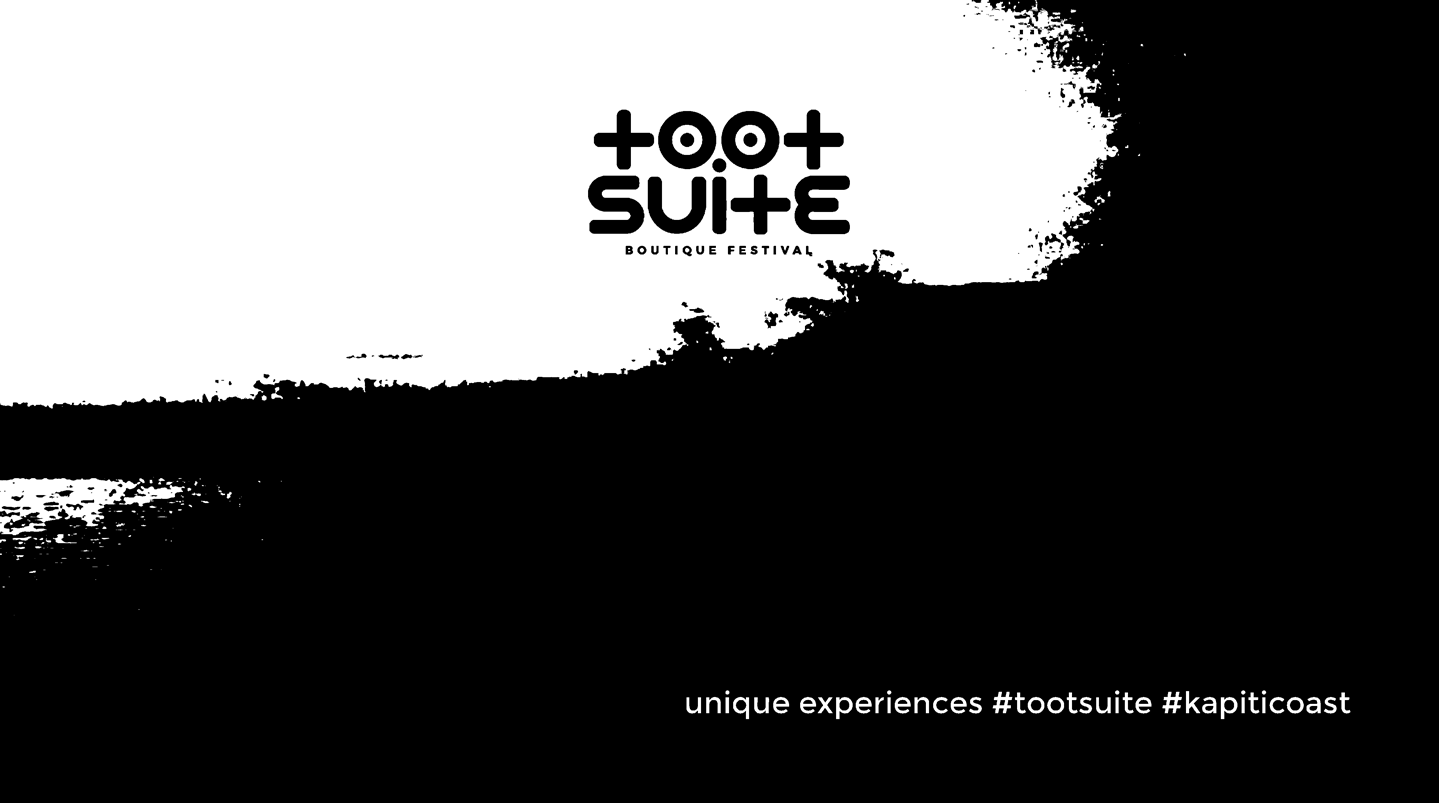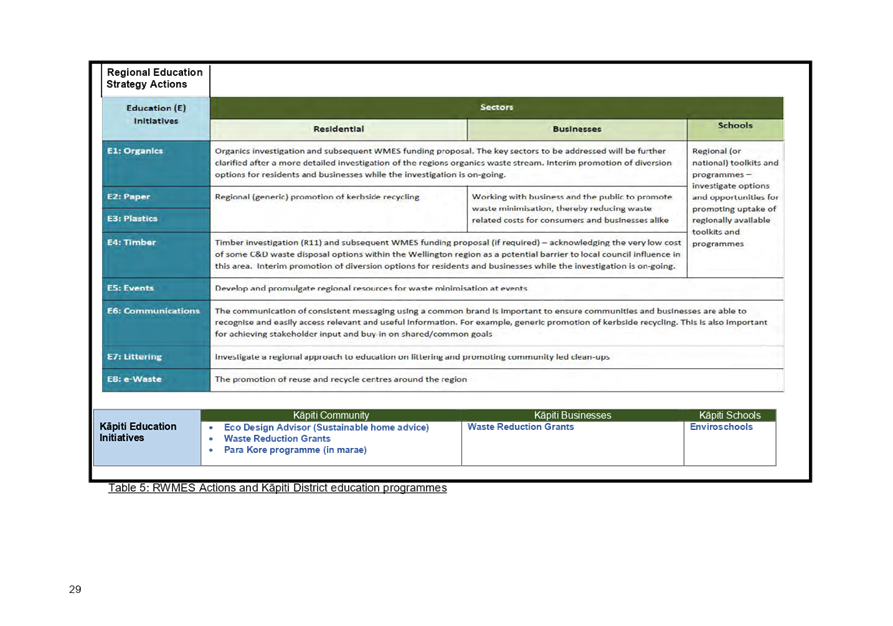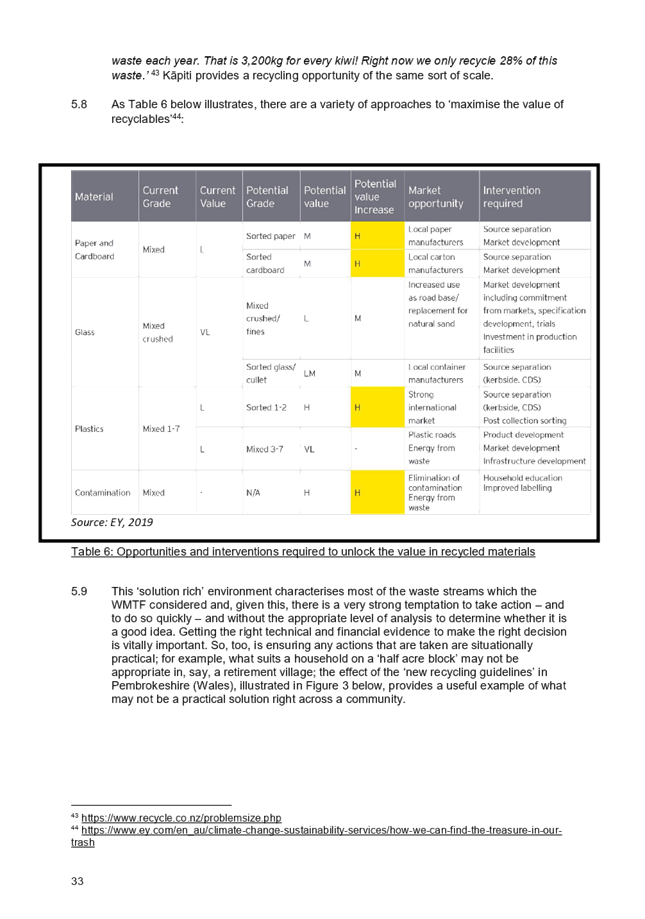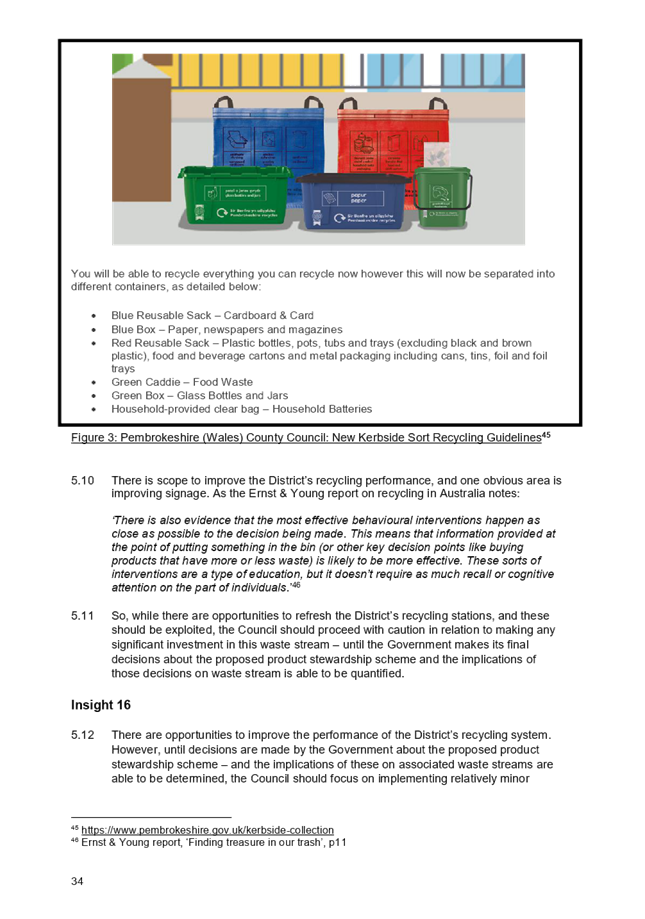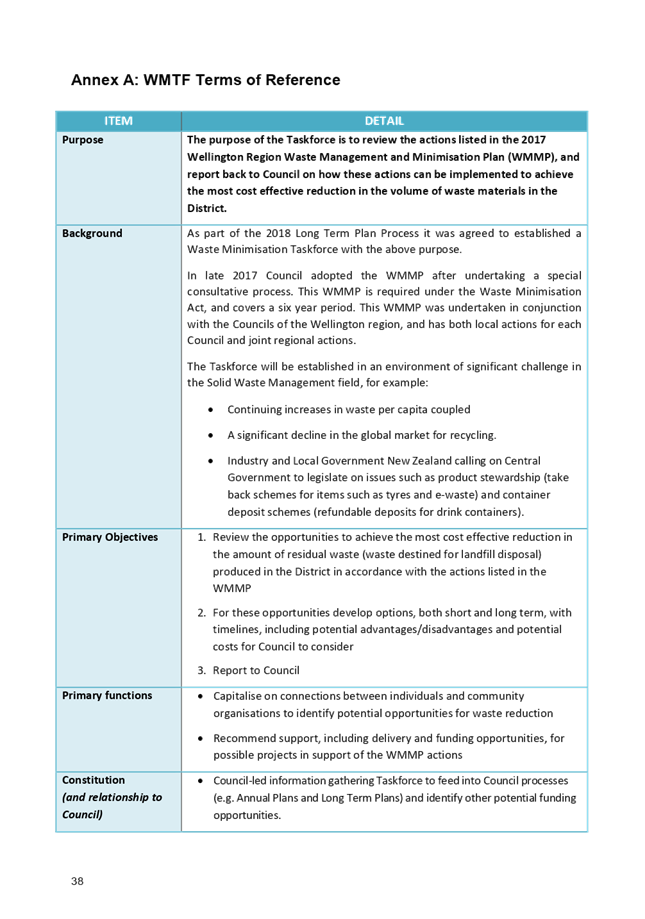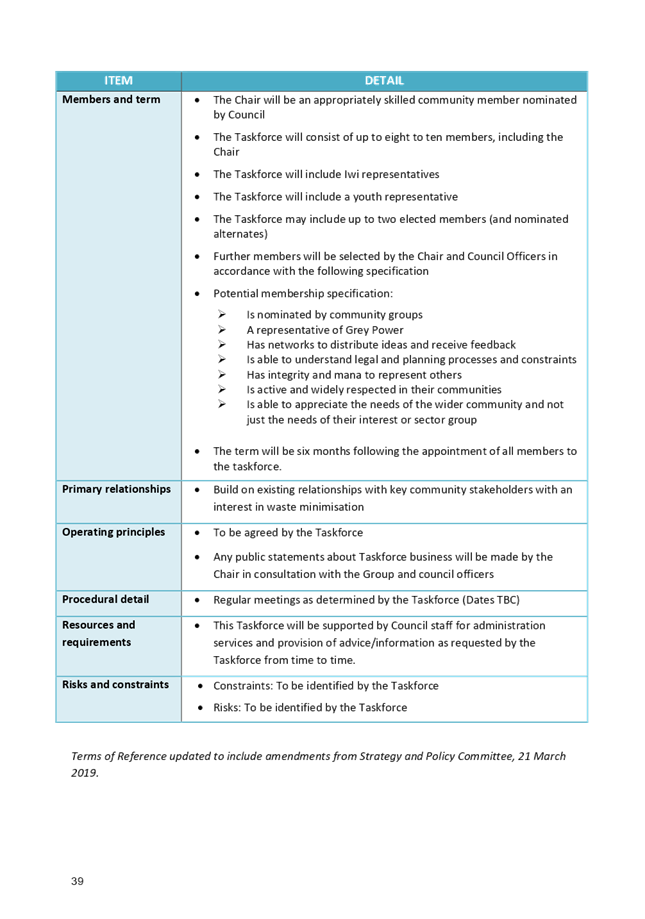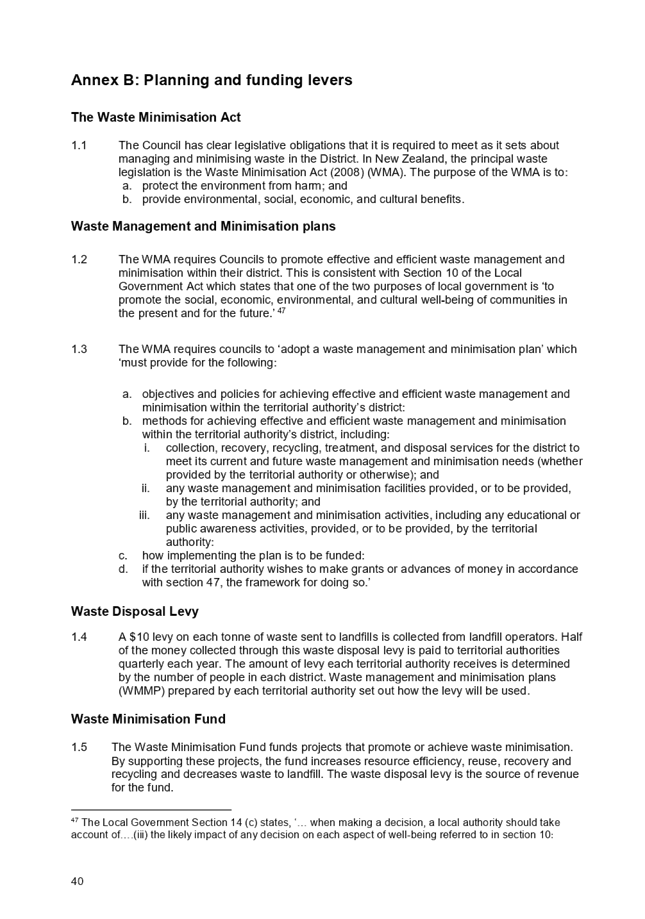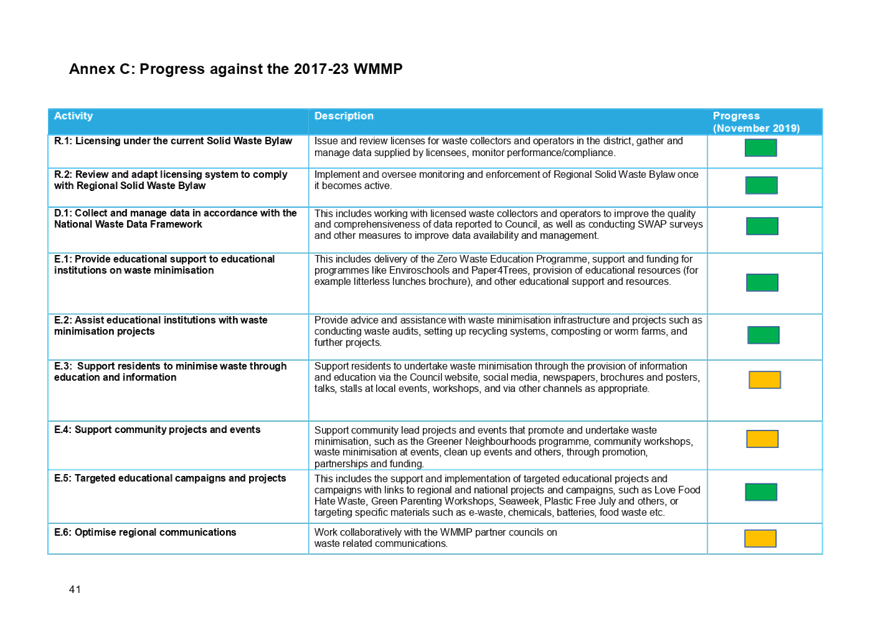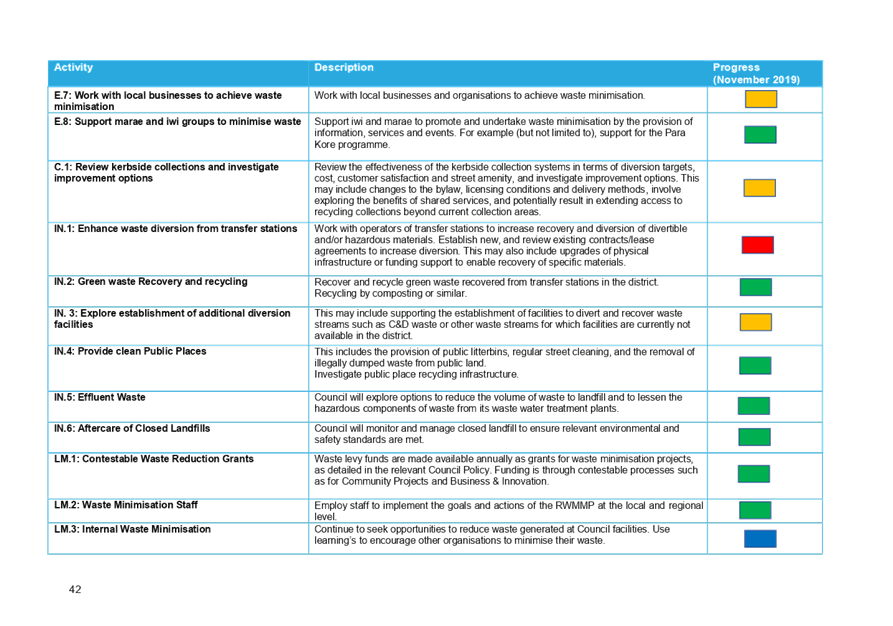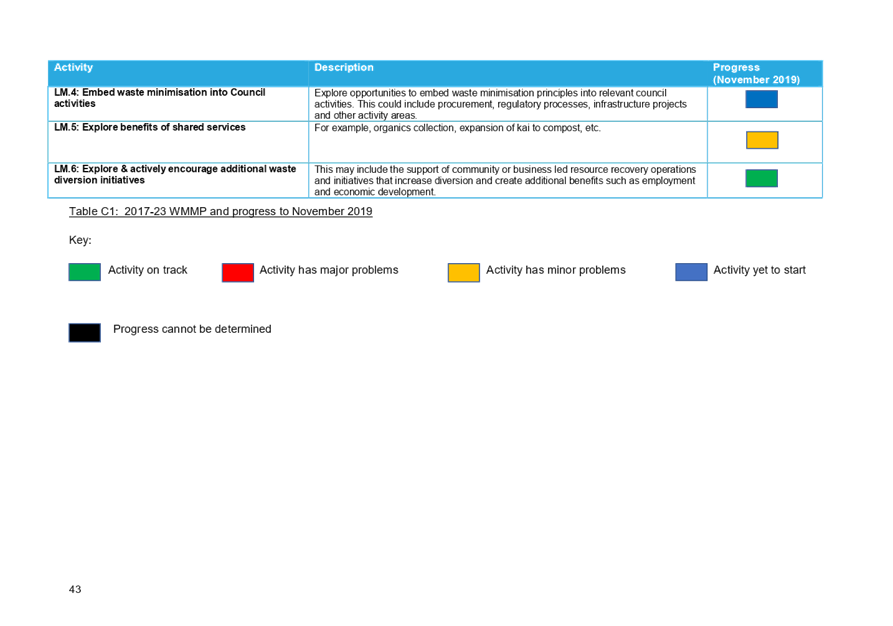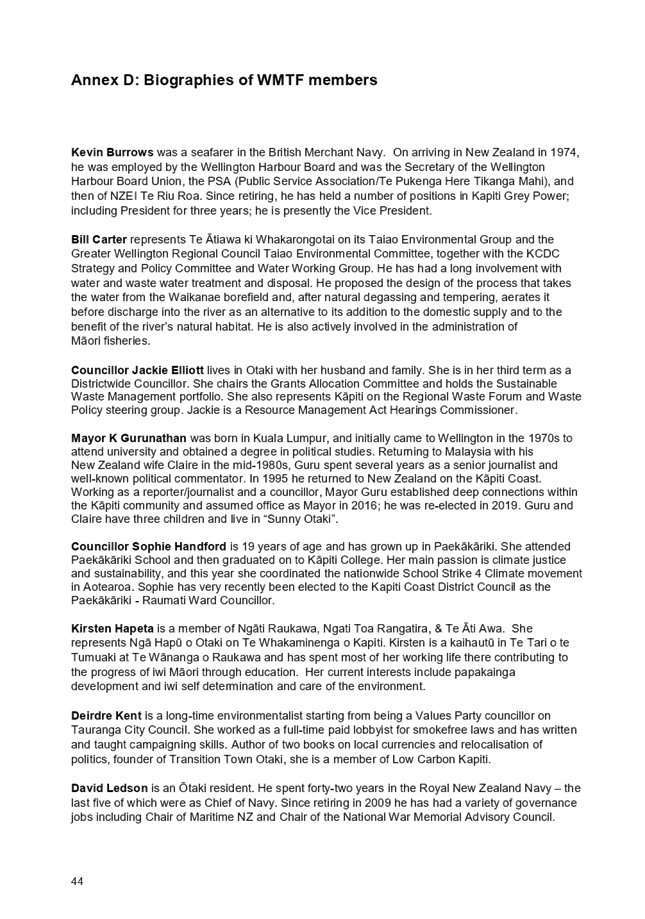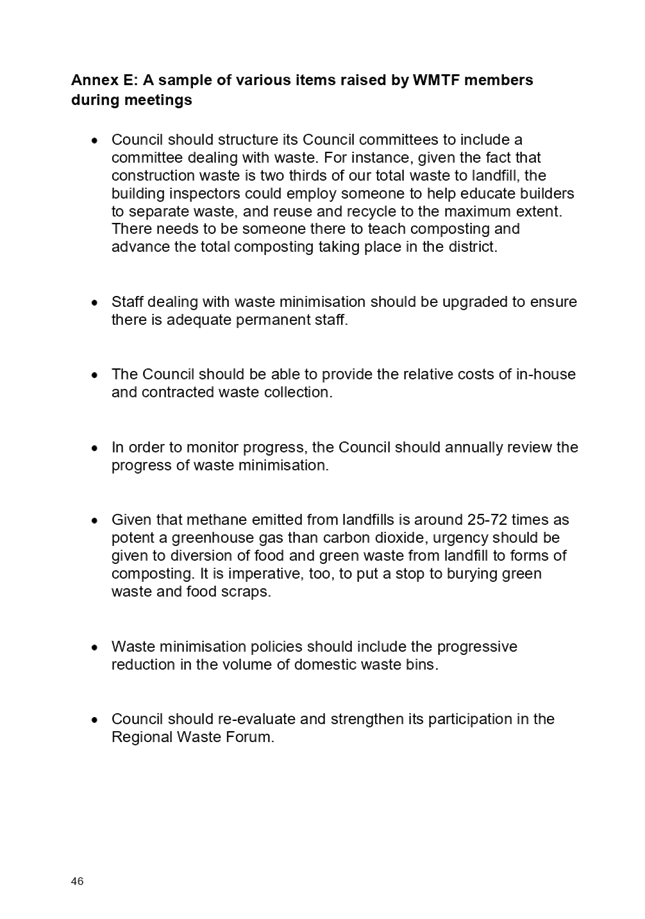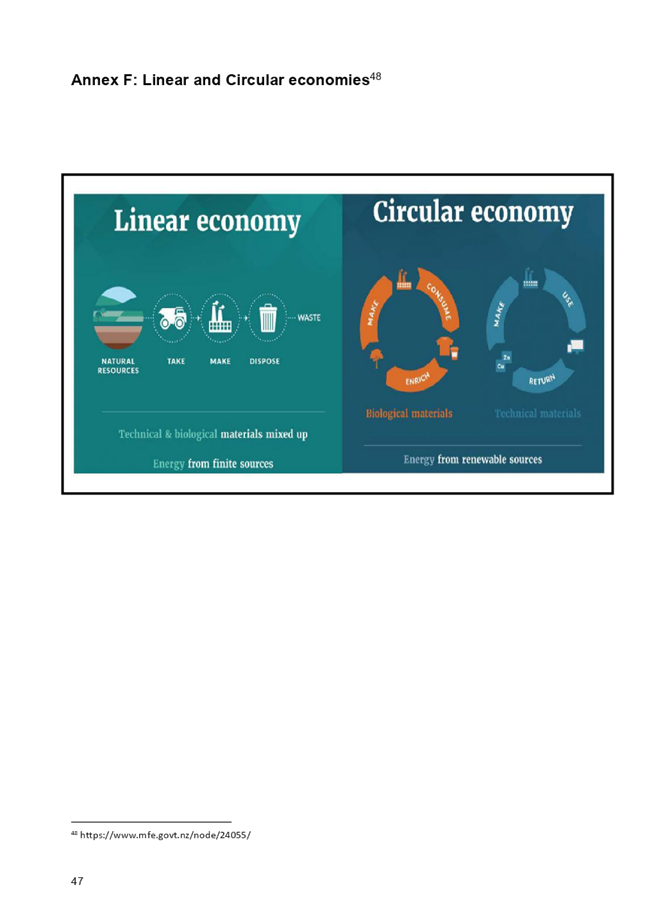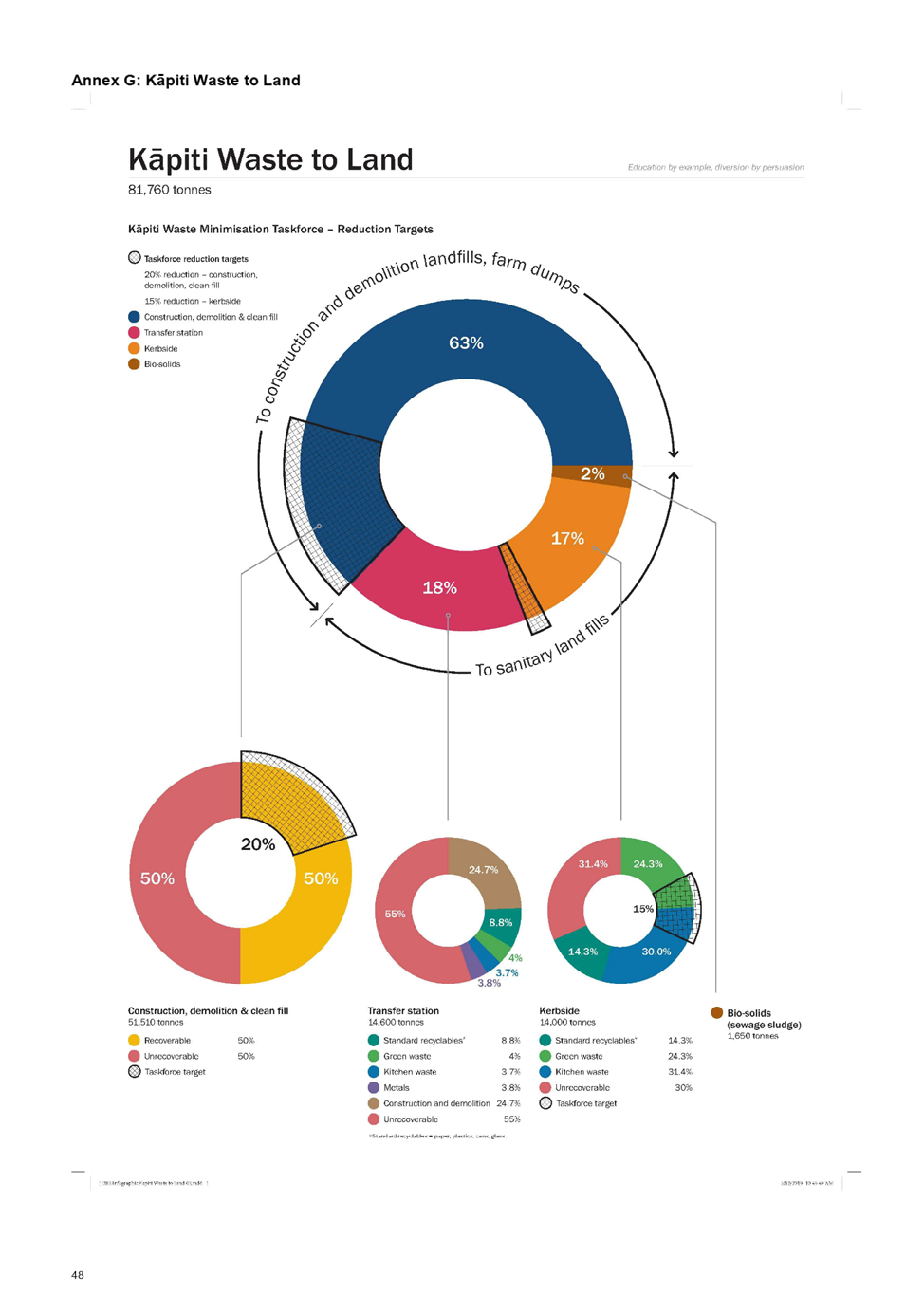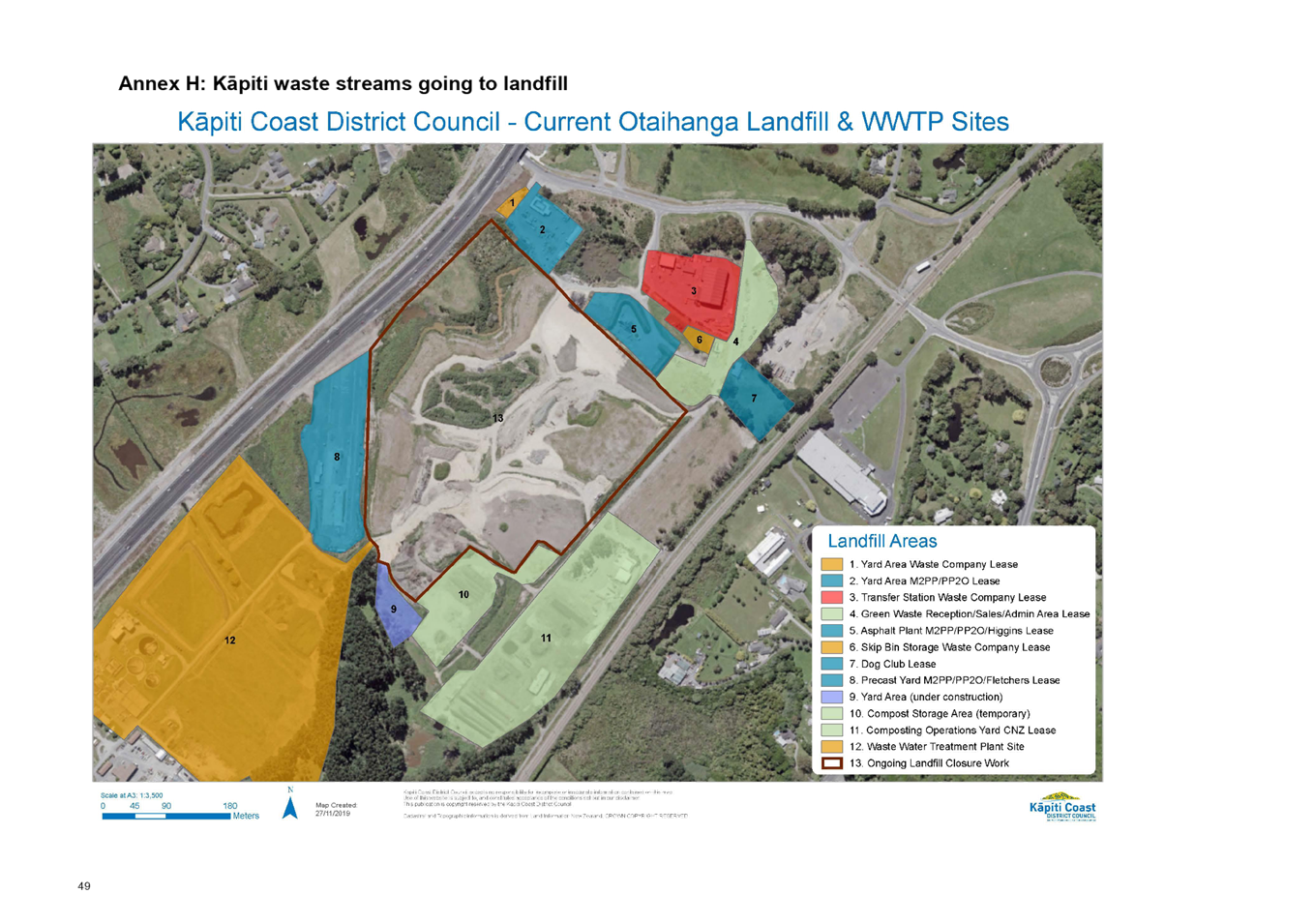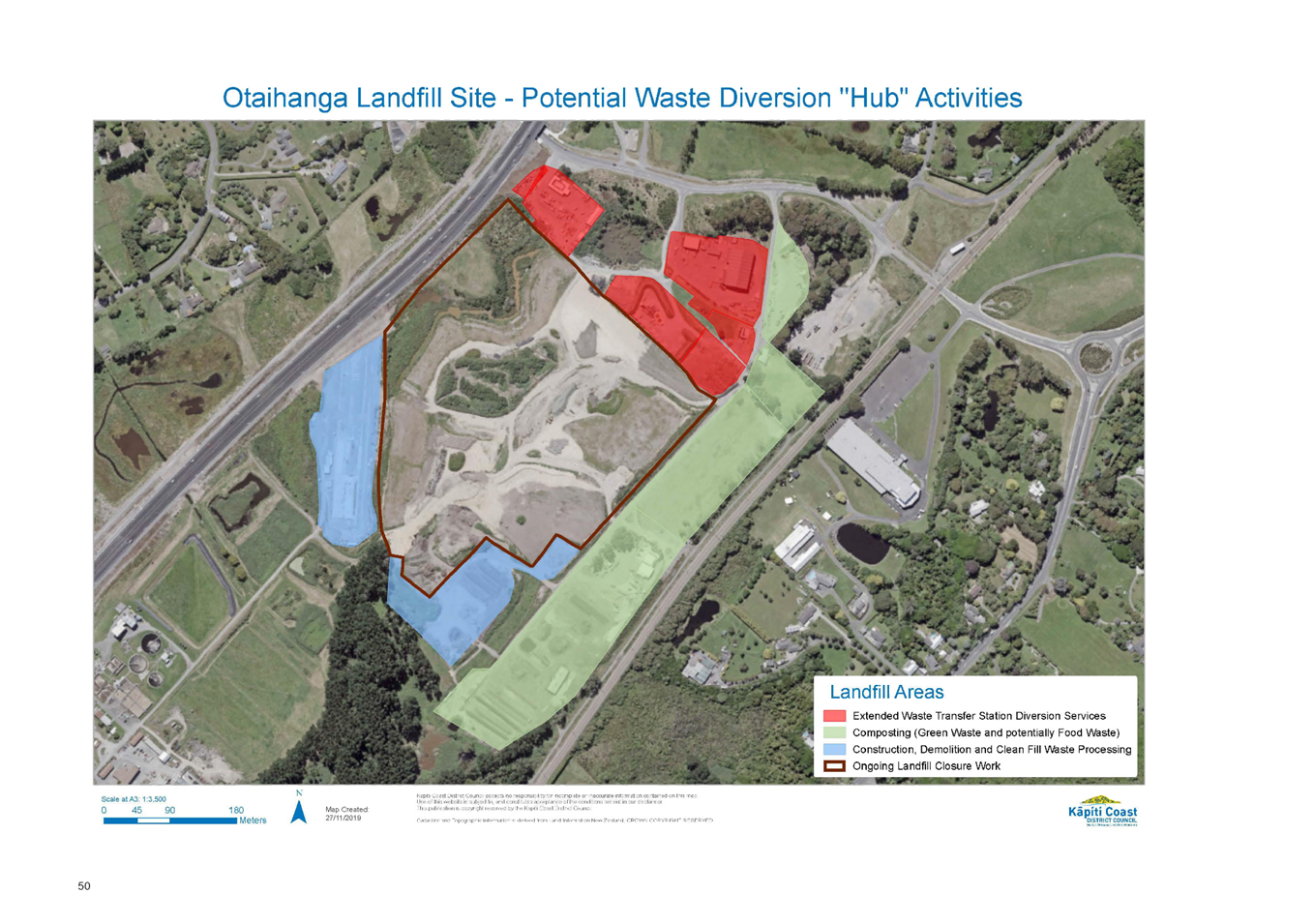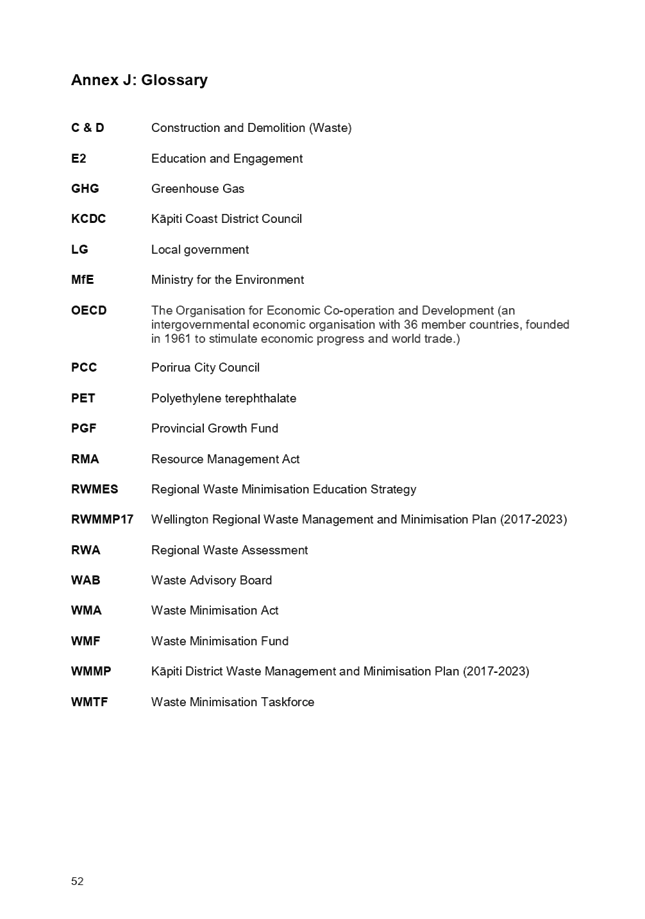|

|
|
AGENDA
Council Meeting
|
|
I hereby give notice that a Meeting of the Kapiti
Coast District Council will be held on:
|
|
Date:
|
Thursday, 12 December
2019
|
|
Time:
|
9.30am
|
|
Location:
|
Council Chamber
Ground Floor, 175 Rimu Road
Paraparaumu
|
|
Wayne Maxwell
Chief Executive
|
|
Council
Meeting Agenda
|
12 December 2019
|
Kapiti Coast District Council
Notice
is hereby given that a meeting of the Kapiti Coast District Council will be
held in the Council Chamber,
Ground Floor, 175 Rimu Road, Paraparaumu, on Thursday 12 December 2019, 9.30am.
Council Members
|
Mayor K Gurunathan
|
Chair
|
|
Deputy Mayor Janet Holborow
|
Deputy
|
|
Cr Angela Buswell
|
Member
|
|
Cr James Cootes
|
Member
|
|
Cr Jackie Elliott
|
Member
|
|
Cr Gwynn Compton
|
Member
|
|
Cr Jocelyn Prvanov
|
Member
|
|
Cr Martin Halliday
|
Member
|
|
Cr Sophie Handford
|
Member
|
|
Cr Robert McCann
|
Member
|
|
Cr Bernie Randall
|
Member
|
2 Council
Blessing
“As we deliberate on the
issues before us, we trust that we will reflect positively on the
communities we serve. Let us all seek to be effective and just, so that with
courage, vision and energy, we provide positive leadership in a spirit of
harmony and compassion.”
I a mātou e whiriwhiri ana
i ngā take kei mua i ō mātou aroaro, e pono ana mātou ka
kaha tonu ki te whakapau mahara huapai mō ngā hapori e mahi nei
mātou. Me kaha hoki mātou katoa kia whaihua, kia tōtika
tā mātou mahi, ā, mā te māia, te tiro whakamua me te
hihiri ka taea te arahi i roto i te kotahitanga me te aroha.
3 Apologies
4 Declarations
of Interest Relating to Items on the Agenda
Notification from Elected
Members of:
4.1 – any interests that
may create a conflict with their role as an elected member relating to the
items of business for this meeting, and
4.2 – any interests in
items in which they have a direct or indirect pecuniary interest as provided
for in the Local Authorities (Members’ Interests) Act 1968
5 Public
Speaking Time for Items Relating to the Agenda
6 Members’
Business
(a)
Public Speaking Time Responses
(b)
Leave of Absence
(c)
Matters of an Urgent Nature (advice to be provided to the Chair prior to
the commencement of the meeting)
7 Mayor's
Report
7.1 Request
to Government to place moratorium on bottled water consents
Author: K
Gurunathan, Mayor
Authoriser: Wayne
Maxwell, Chief Executive
Appendices
1. Request
to government to place moratorium on bottled water consents ⇩ 
|
Council
Meeting Agenda
|
12 December 2019
|


8 Reports
8.1 Fees
Framework for Non-Elected Members 2019-2022 Triennium
Author: Leyanne
Belcher, Democracy Services Manager
Authoriser: Janice
McDougall, Group Manager
Purpose of Report
1 This
report seeks the Council’s approval of a revised Fees and Expenses
Framework for the payment of non-elected members who are acting in a governance
role on Council decision-making bodies.
Delegation
2 Only
Council may consider this matter.
Background
3 The
Local Government Act 2002 (Schedule 7, Section 31(3)) provides that the Council
may appoint to a committee or subcommittee a person who is not an elected
member if that person has the skills, attributes and knowledge that will assist
the work of the committee or subcommittee.
4 Currently
the Council allows for the appointment of a range of non-elected members on
different decision-making and/or advisory bodies (including independent
members, iwi members, community and youth representatives, and Māori
representatives).
5 In
2017 the Council approved a Fees Framework for non-elected members, based on
the Cabinet Fees Framework, with the aim of providing equity, consistency,
flexibility, and transparency in the payment of these groups.
6 On 17 June 2019, a revised Cabinet Fees Framework,
Circular CO (19) 1, was issued.
7 This paper proposes revision to the ‘Fees
Framework for non-elected members’, attached as Appendix 1, based on the
revised Cabinet Fees Framework.
8 The
Fees Framework for non-elected members has been revised to reflect a new
category for payment of members of Audit and Risk Committees and some modest
increases to the fees ranges for local government bodies under Group 4.
9 The
Fees Framework does not make provision for the following:
· Elected
Members appointed as Hearing Commissioners – these are remunerated
through the Remuneration Authority’s determinations applying to councils.
· The
three advisory groups (Cycleway, Walkway and Bridleway, Accessibility, and Road
Safety). Also excluded are the Youth Council and the Older Persons’
Council, and the Public Art Panel.
· Iwi
or other non-elected members assisting through Working Parties associated with
specific projects. Their remuneration is covered off through project budgets.
· List
members of the District Licensing Committee (DLC) – their remuneration is
prescribed through the Sale and Supply of Alcohol Act 2012.
· Payment
of iwi through rūnanga contractual arrangements
· Payment
for attendance at Council briefings.
Issues and Options
Issues
10 It
is not proposed to make substantive changes to the current framework, other
than to reflect increases based on the revised fees framework and include a fee
for an Independent Chair of the Audit and Risk Subcommittee.
11 The
revised Cabinet Fees Framework recognises
the skill and expertise required of chairs and members of audit and risk
committees and the complexity of the matters on which they advise, and approves
higher fees for these positions.
Considerations
Policy
considerations
12 There
are no additional policy considerations.
Legal
considerations
13 There
are no additional legal considerations.
Financial
considerations
14 The
financial implications of adopting the new mid-point of the suggested bands
would result in a total budget requirement across all non-elected members of
approximately $22702 per annum (see table below)
|
POSITION
|
NO OF MTGS PER YEAR
|
PROPOSED MEETING FEE (5.5hrs, includes preparation)
|
ANNUAL $
|
|
Chair
of Te Whakaminenga o Kāpiti
(TwoK)
|
7
|
$294
|
$2,058
|
|
Chair
of TWOK attending Council meetings and workshops
|
11 Council meetings
2 Annual Plan or Long Term Plan workshops (estimate)
|
$294
$294
|
$3,234
$588
|
|
Other
iwi members of TWOK (4)
|
7
|
$206
|
$5,768
|
|
Māori
rep Strategy & Operations Cttee (1)
|
12
|
$206
|
$2,472
|
|
ART
Chair (1)
|
As required
|
$294
|
|
|
ART
members (2)
|
|
$206
|
|
|
Independent
member of Audit and Risk Subcommittee (2)
|
5
|
$580 Chair
$436 Member
|
$2900
$2180
|
|
Grants
Allocation Committee – Creative Communities NZ programme (7)
|
2
|
$206
|
$2,884
|
|
Grants
Allocation Committee – Community Grants (3)
|
1
|
$206
|
$618
|
|
GRAND TOTAL
|
$22702
|
Tāngata
whenua considerations
15 The
appointment of Māori on various decision-making bodies aligns with the
Council’s obligations under the Local Government Act 2002. A broader
review of the payments made to Māori will be undertaken in consultation
with Te Whakaminenga o Kāpiti.
Significance and Engagement
Significance
policy
16 This
matter has a moderate degree of significance under the Council’s
Significance and Engagement Policy.
Engagement
planning
17 An
engagement plan is not needed to implement this decision.
Publicity
18 Council’s
decision will be publicised through the usual communication channels.
|
Recommendations
That Council revokes the 2017
Fees Framework and Expenses Policy for Non-Elected Members
That Council approves the
Fees Framework and Expenses Policy for Non-Elected Members as revised at
Appendix 1 of the report “Fees Framework for Non-Elected Members
2019-2022 Triennium.”
|
Appendices
1. Fees
Framework for Non Elected Members ⇩ 
|
Council
Meeting Agenda
|
12 December 2019
|
APPENDIX 1
DRAFT
Fees and Expenses Framework for Non-Elected Members
This document sets out the policy on payment of fees and
expenses to non-elected members.
This policy is administered by Kāpiti Coast District
Council’s Democracy Services Manager.
This policy may be reviewed annually and is current until
superseded.
What this
document covers
Kāpiti
Coast District Council Fees Framework
1. The
Kāpiti Coast District Council Fees Framework is used for setting the fees
of appointed members of committees, or other bodies
established by Council.
2. The Framework does not apply:
· if payment is set by the Remuneration Authority, or by
legislation
· if payment is made from some other source (for
example, if a professional consultant is paid by his or her employer to attend)
· to any appointments made by the Council or a Community
Board to an outside organisation
· if the Council has formally resolved a different form
of payment
· if payments are made on a contractual basis e.g. independent
commissioners.
Expenses
policy
3. The
Expenses Policy sets out the criteria and type of expense that will be
reimbursed and applies to all non-elected members, unless personal expense is
compensated in some other way.
Kāpiti
Coast District Council Fees Framework
4. The Kāpiti Coast District
Council Fees Framework is aligned to the Cabinet Fees Framework, which is used
by many Government bodies whose fees are not determined by the Remuneration
Authority. The Kāpiti Coast District Council Fees Framework ensures
consistency between fees paid to non-elected members of Kāpiti Coast
District Council bodies and fees paid by Government to those on entities in
which the Crown has an interest.
5. Most appointments that are made
by the Council will be to bodies which can be described as “Group 4 ‐ all other committees
and other bodies” within the Cabinet Fees Framework. The assessment
criteria for Group 4 have been adapted for use by Kāpiti Coast District
Council. The Cabinet Fees Framework was last reviewed in June 2019.
Assessment
process
6. The body (committee,
subcommittee, advisory body) will be scored on the following factors:
· skills, knowledge and experience required of members
· function, level and scope of authority
· complexity of issues
· public interest and profile.
7. The assessment criteria are
based on the Cabinet Fees Framework but modified for Kāpiti Coast District
Council.
8. The resulting total score is
used to identify a remuneration band within the Cabinet Fees Framework. The
Council decides the remuneration to be paid from within that band. Proposed
fees for the 2019-2022 Triennium are at Appendix B.
Daily rates
9. The remuneration bands are
expressed as daily rates.
10. A daily rate is a good basis for
calculating fees to be paid for attending meetings of groups such as
committees, subcommittees and working groups. This is because the length of a
meeting tends to be relatively consistent from one meeting to the next. A
“meeting fee”, based on the daily rate, is set and applied to all
meetings.
11. The daily fee applies to all work,
including that performed outside of meetings (e.g. preparation, representing
the body at other forums, or administrative work) that is required for the body
to carry out its role. All work that is required to be performed for the body
by the member should be paid at the approved daily rate.
12. Work
other than preparation for meetings must be approved and recorded by the body
before it is undertaken. Individual members should not be in a position where
they could be considered to be setting their own work programmes without the
endorsement of the body. The ability of the body to approve additional meetings
or work is subject to agreement by the Council.
Hourly rates
13. Hourly
pro‐rata rates will
be calculated by dividing the daily rate by 8 and multiplying by the number of
hours worked.
Deputy chair
14. Where a body’s non-elected member is
elected or appointed as a deputy chair who shares the business workload with
the chair between meetings, an additional fee of 25% of a member’s fee
will be paid.
15. Where
a body does not appoint a deputy chair, then in any instance where a member
chairs a meeting that member will receive the daily rate of the chair for that
meeting.
General
absence
16. Where
a member fails to attend a significant number of meetings, or otherwise perform
their duties as a member, the chair needs to raise the issue of expectations
about performance with the member and if necessary with the Mayor.
Consideration should be given at the time of reappointment of members to the
issue of continued absences from body business.
Reimbursement
of expenses
17. The principles on which reimbursement of
expenses will be approved are:
· Payments will be for actual and reasonable expenses;
this requires receipts to be produced and expenditure to be modest
· For payment of work conducted other than attending the
normal monthly meetings it must be properly approved and recorded prior to the
work being carried out.
18. Reimbursement
for the costs of travel (and other expenses) will be based on the Elected
Member Allowances and Expenses Policy.
APPENDIX A ‐ Assessment criteria
Skills,
knowledge and experience required of members
Skills,
knowledge and experience will vary between members on a particular body. The
score below should reflect the level of skill required by the majority of
members, and should not be based on any particular individual. This factor has
a higher weighting than others, to reflect that it is the application of
the skills, knowledge and experience in carrying out their responsibilities
that is a major contributor to the successful operation of the committee or
body.
|
|
Definition
|
Score
|
|
Pre–eminent
|
Outstanding
and authoritative knowledge, recognised nationally and internationally for
expertise in a particular field.
|
12
|
|
Distinguished
|
Deep
and broad knowledge in a specific area or as a leader. Widely respected as a
subject matter expert or authority in their field.
|
10
|
|
Substantive
|
Substantial
range of knowledge and experience in a field or professional discipline
sometimes associated with senior level functional or technical leadership,
executive management or governance roles. May include widely respected people
with broad community support.
|
8
|
|
Technical
|
A
number of years’ experience in a technical, professional field or in a
leadership role is a pre‐requisite.
|
6
|
|
Specialised
experience
|
No
specific experience is required but members would have broad general knowledge
and may represent a body of opinion.
|
4
|
Function, level and scope of
authority
|
|
Definition
|
Score
|
|
Strategic
decisions
|
Sets
policy or work programme for a major area of economic activity or policy area
of importance to the Council’s strategic priorities.
|
6
|
|
Policy
decisions
|
Sets
policy or work programme and/or exercises regulatory/disciplinary powers.
|
5
|
|
Expert
advice
|
Provides
expert counsel and advice to the Mayor, Governing Body or local boards on
technical or policy issues that are of strategic importance. At this level
the body would be expected to be proactive in identifying emerging issues and
contributing to policy direction.
|
4
|
|
Professionally
targeted
|
Exercises
regulatory/disciplinary powers at the individual/professional level. This
will include the power to impose sanctions
|
3
|
|
Technical
|
Provides
a broad range of advice on technical and/or policy issues.
|
2
|
|
Ad
hoc
|
Provides
ad hoc advice on minor matters. Generally a limited focus at a single output
level.
|
1
|
Complexity of issues
|
|
Definition
|
Score
|
|
Innovative
|
The development of
new concepts is required to find innovative and path finding solutions. There
will be little or no external guidance (NZ or internationally) to aid
resolution of these issues.
|
5
|
|
Constructive
|
The development of
new policy or advice is required where the issues are complex,
multidimensional and involve substantial research, consideration of possible
alternatives and their consequences. The body may commission research or
utilise the findings to inform their policy development or advice.
|
4
|
|
Evaluative
|
Issues will include
circumstances, facts and concepts different to those that have been
experienced in the past. Analytical thinking and evaluative judgement will be
required to identify realistic alternatives and apply/recommend a solution.
|
3
|
|
Judgement
|
Solutions will be
found from application of professional or personal judgement and generally
guided by previous decisions. Circumstances may be different from those
previously experienced but there will be a sufficient frame of reference to
make a considered decision/recommendation.
|
2
|
|
Operational
|
Issues to be
resolved are generally within existing policy and prior decisions. Decisions
can generally be made quickly and with reasonable certainty.
|
1
|
Public interest and profile
|
|
Definition
|
Score
|
|
Widespread
|
Widespread public
interest in outcomes would be expected. Members will attract strong media
interest. Potential risk to personal and/or the body’s reputation is
high.
|
5
|
|
Strong
|
Strong public and
stakeholder interest and importance would be associated with these issues.
Media interest would also be expected, but potential risk to personal or the
body’s reputation is unlikely.
|
4
|
|
Moderate
|
Moderate but
widespread public interest is likely. Reputational risk is minimal.
|
3
|
|
Limited
|
Public interest is
likely to be limited, but the issues would be of interest to other members of
the particular profession or sector.
|
2
|
|
Little
|
There is likely to
be little or no wider public interest in the decisions.
|
1
|
Fee levels
|
Total
score
|
Level
|
Fees
range ‐ Chair
|
Fees
range ‐ members
|
|
24-28
|
1
|
$540
– $1,150
|
$405
- $865
|
|
20 -
23
|
2
|
$390
- $885
|
$290
- $560
|
|
15
– 19
|
3
|
$280
- $575
|
$205
- $395
|
|
10
– 14
|
4
|
$250
- $365
|
$190
- $270
|
|
9 or
less
|
5
|
$205
- $265
|
$150
- $205
|
APPENDIX
B – Determination of fees
Council,
Strategy and Operations and Subcommittee, Te Whakaminenga o Kāpiti, Grants Allocation Committee and the ART
Confederation.
|
Skills, knowledge
& experience
|
The committees and
subcommittees include widely respected community leaders in their various
communities of interest.
|
8
|
|
Function, level
& scope
|
The committees and
subcommittees provide advice on a range of policy matters that are relevant
to the communities they represent.
|
4
|
|
Complexity of issues
|
Analytical thinking
and evaluative judgement are required to consider alternatives and make
recommendations.
|
3-4
|
|
Public interest and
profile
|
There is widespread
public interest in their work and reputational risk is moderate to high.
|
3 - 4
|
|
TOTAL
|
|
16 - 19
|
Equivalent daily rates
|
Remuneration level
|
Chair (midpoint)
|
Member
|
|
3
|
$427
|
$300
|
Fees for these decision-making
bodies will be based on the midpoint of the daily rates for this level. The
daily rate constitutes 8 hours. A meeting fee is calculated by applying the
equivalent hourly rate to an approximate average length of a meeting, including
preparation time.
Meeting
fees
|
Meeting fee
|
2019-2022
|
2016-2019
|
|
Member (based on 5.5
hours per meeting including preparation)
|
$206
|
$190
|
|
Chair (based on 5.5
hours per meeting including preparation)
|
$294
|
$272
|
Where an
appointed person is elected or appointed as deputy chair to share the workload
of the chairperson, he or she will receive a payment that is 25% higher than
that of a member.
Audit
and Risk Subcommittee
Due to the skill and expertise
required and the complexity of the matters on which they advise, higher fees
have been recommended out of the revised Cabinet Fees Framework .
Equivalent daily rates
|
Remuneration level
|
Chair
|
Member
|
|
1
|
$845
|
$635
|
Meeting
fees
|
Meeting fee
|
2016-2019
|
Previous term
|
|
Chair (based on 5.5
hours per meeting including preparation)
|
$580
|
N/A
|
|
Member (based on 5.5
hours per meeting including preparation)
|
$436
|
$190
|
Where an appointed person is elected
or appointed as deputy chair to share the workload of the chairperson, he or
she will receive a payment that is 25% higher than that of a member.
Additional
work
Where work
is undertaken with prior approval and a meeting fee is not appropriate in the
circumstances, the Manager Democracy Services may determine payment on an
hourly rate based on the daily rate, subject to the terms of reference as
agreed with the Council (refer paragraph 14 above).
8.2 Amendments
to the Council Delegations to Chief Executive and Staff
Author: Sarah
Lloyd, Senior Advisor Corporate Planning & Reporting
Authoriser: Mark
de Haast, Group Manager
Purpose of Report
1 This
report seeks Council’s approval of amendments to Council delegations to
the Chief Executive and staff including Resource Management Act 1991
delegations.
Delegation
2 Council
has the authority to consider this matter.
3 The
delegations comply with the provisions of the Local Government Act 2002 (clause
32, schedule 7), which empowers the Council to consider an appropriate
governance structure and associated delegations.
4 It
also meets the requirements of section 10 of the Local Government Act 2002 which
prescribes the purpose of local government.
Background
5 The
Council has certain statutory powers it can exercise and duties it must fulfil.
Various statutes recognise that it is not efficient or practical for Elected
Members to have to deal with every aspect of their functions, duties and
powers.
6 Various
Acts of Parliament provide the Council with the legal authority to delegate to
Officers. In particular, Council has the authority to delegate to Officers
under clause 32 of Schedule 7 of the Local Government Act 2002. Clause 32 of
the Local Government Act 2002 also sets out certain powers that cannot
be delegated as follows:
“32. Delegations‒(1) Unless expressly provided otherwise
in this Act, or in any other Act, for the purposes of efficiency and effectiveness
in the conduct of a local authority's business, a local authority may delegate
to a committee or other subordinate decision-making body, community board, or
member or officer of the local authority any of its responsibilities, duties,
or powers except‒
(a) the power to make a rate; or
(b) the power to make a bylaw; or
(c) the power to borrow money, or purchase or dispose of
assets, other than in accordance with the long-term plan; or
(d) the power to adopt a long-term plan, annual plan, or
annual report; or
(e) the power to appoint a chief executive; or
(f) the power to
adopt policies required to be adopted and consulted on under this Act in
association with the long-term plan or developed for the purpose of the local
governance statement.
(h) the power to adopt a remuneration and
employment policy.”
7 Delegated
authority allows for administrative efficiency and ensures timeliness in the
conduct of Council’s daily business activities.
8 The
majority of the Acts allow the Chief Executive the discretion to sub-delegate
to council staff. However, some Acts prescribe the way delegations must be
made. For example, the Resource Management Act 1991 (RMA 1991) does not allow
the Chief Executive the power to sub-delegate.
Issues
9 The
Council delegations to the Chief Executive and staff are monitored on a regular
basis and reported back to Council for amendment as required, in response to
changes in staff or legislation.
10 The
required amendments are outlined below and detailed in the appendices.
Council
to Chief Executive and Staff Delegations
11 In
order to future proof the impact on delegations due to any possible change in
Governance Structure regarding Committees and for the avoidance of doubt, staff
have recommended an additional clarification in the foreword of the Council to
Chief Executive and Staff delegations as follows - see Appendix A for full
delegation (also includes the changes to Committees in the Governance Structure
approved 7 November 2019):
‘a reference in this
document to a Council Committee includes any Committee that replaces or
corresponds to that Committee and involves substantially the same duties;’
12 Following
advice from Buddle Findlay in respect of the Council’s ability to
sub-delegate powers under the Reserves Act 1977, staff have recommended the
following amendments (see strike-outs and yellow
highlights below) to the Council to Chief Executive Reserves Act 1977
delegation.
The recommended amendment in
delegations will streamline what is largely an administrative process and more
rapid decisions for the community groups involved. The Chief Executive
can approve the public notification of proposed leases, licences and permits up
to the maximum 33-year term provided by the Act. If, as a result of public
notification, objections are received then the matter must be brought before
Council for consideration of objections and a decision whether to grant the
lease, licence or permit. However, if no objections are received, the
Chief Executive can approve the granting of the lease, licence or permit.
Where public notification is not
required (for example, but not limited to, where the granting of a lease,
permit or licence is contemplated by a Reserve Management Plan), the Chief
Executive will approve the granting of such a lease, licence, easement or
permit.
|
Legislation and Authority
|
Powers Delegated
|
|
Reserves
Act 1977 and any regulations made under that Act
To the
Chief Executive with power of sub-delegation to officers.
|
Delegation
of authority to exercise and administer all responsibilities, duties and
powers* of the Council in its role as landowner, Administering
Body or
where appointed to control and manage, and as a delegate
of the Minister of Conservation, under the Reserves Act 1977 and any
regulations made under the Act and management plans including
but not limited to the power to:
a) publicly notify the intention to grant a lease,
licence, easement, concession or permit and where no objections are received,
to grant the lease, licence, easement, or permit.
Except:
a-q can be seen in Appendix A.
r) the
power to grant leases, licences, permits and easements for reserve land.
For
the avoidance of doubt:
- exceptions b)
and p) do not preclude the power to recommend or report to the Strategy and Operations and Finance Committee or Council on these
matters;
- exception r)
does not include the powers relating to licences under section 74 as
delegated to the Chief Executive and other officers below.
* For
leases, easements, transfers and other documents dealing with land, see notes
about deed execution under the Local Government Act 2002 delegations
|
|
To the
Chief Executive, the Group Manager Place and Space and the Parks and
Recreation Manager with no power of sub-delegation.
|
Delegation
of the power under section 74 of the Reserves Act to issue and cancel
licences to occupy reserves temporarily.
|
13 On
27 June 2019 Council approved an amendment to the Chief Executive and Staff
Local Government Act 2002 delegations with unintended consequences. Since this
amendment staff have recognised the impracticalities regarding the amendment to
non-council leases as it inhibits the ability to be proactive when commercial
opportunities arise.
In addition, limitations in
regards to leases and licences to occupy do not cover the intricacies of
tenure, renewal and termination clauses. With this in mind, and to provide
greater clarification to delegated staff, further amendments are recommended in
relation to the Local Government Act 2002 delegation.
In order to avoid an element of
doubt, staff have also requested the addition of ‘per debt’
as a qualifier regarding the Local Government Act 2002 delegation for
writing off debt.
The following amendments (see strike-outs
and yellow highlights below) have been
suggested:
|
Legislation and
Authority
|
Powers Delegated
|
|
Local Government Act 2002 and any regulations made under that
Act
To the Chief Executive with power of sub-delegation to
officers.
|
Delegation of authority to exercise and administer all
responsibilities, duties and powers of the Council under the Act and any
regulations made under the Act, except:
· the powers set out in clause 32(1)(a) to (h) of Schedule
7 of the Act;
· any Local Government Act 2002 power expressly reserved to
the Council or expressly delegated by the Council to a committee;
· where sections 138 or 140 of the Local Government Act
2002 apply; or
· as limited by the conditions set out below.
Delegation of authority to affix the
Council's common seal:
· to any warrants issued by the Council where the warrants
authorise entry onto private land on behalf of the Council;
· to any deed entered into by Council (Note that leases,
easements, instruments and other land-related documents are deemed to have
the same effect as deeds and should be executed as deeds. See clause 13
of the Land Transfer Regulations 2002);
· to any document that has been prepared to implement a
resolution previously made by the Council; and
· in any other situation where the Council is directed by
legislation to use its common seal;
providing that the signature of the Chief Executive
followed by that of the Mayor or Deputy Mayor and one Councillor have first
been obtained and that the use of the common seal is recorded in a register
and advised to Council on a weekly basis via the Elected Members Bulletin.
Without limiting the powers delegated to the Chief
Executive above, the Chief Executive may:
· implement any proposal or decision contained within the
Council's Long Term Plan (LTP) or Annual Plan or other adopted Council
policy;
· issue warrants under the Local Government Act 2002 or any
other enactment under which Council officers may be warranted;
· appoint enforcement officers under section 177 of the
Act;
· give approval to matters or activities relating to land
or buildings under the control, authorisation or ownership of the Council,
except as limited by clause 32(1)(c) of Schedule 7 of the Act;
· grant leases of residential properties (see note above
about deed execution);
· grant leases of Council land property or non-residential buildings
where the term of the lease is 10
years or less, including right of renewals
and where the total rent over the duration of the lease aligns with a
Council Officer’s financial delegation (see note above about deed
execution);
· grant licences to occupy Council land property where the term of the licence is 3
years or less (see note above about deed
execution);
· grant easements over land (see note above about deed
execution); and
· enter into other deeds, contracts or
agreements (including but not limited to leases of non-Council property and
licences to occupy non-Council property).
· enter into leases of non-Council land where the term of
the lease is 3 years or less and where the total rent over the duration of
the lease aligns with a Council Officer’s financial delegation; and
· enter into licences to occupy non-Council land where the
term of the licence is 3 years or less.
The following conditions apply to the exercise of the
Chief Executive's delegated powers under the Act:
· The Chief Executive may commit Council expenditure for
any deeds, contracts or agreements up
to $2.4million, for any one deed,
contract or agreement, including the authority to enter into such a deed, contract or agreement, providing that
before exercising these powers the Chief Executive is satisfied that full
allowance has been made and remains for the proposed expenditure in an
approved budget and that, if applicable, all tenders accepted over a value of
$250,000 are reported to the Strategy and
Operations and Finance Committee;
· The Chief Executive may sub-delegate the authority to
commit the Council to expenditure for any deeds,
contracts or other agreements under approved circumstances eg
mediation, leases of non-Council property and
licences to occupy non-Council property, and subject to any conditions that
the Chief Executive may impose, for a lesser amount than $600,000 and no more than an officer’s financial
delegation, for any one deed,
contract or agreement, including the authority to enter into such a deed, contract or agreement, providing that
before exercising these powers the sub-delegate is satisfied that full
allowance has been made and remains for the proposed expenditure in an
approved budget and that, if applicable, all tenders accepted over a value of
$250,000 are reported to the Strategy and
Operations and Finance Committee;
· The Chief Executive (with the power to sub-delegate) may
write off sundry debts (excluding rating debts) up
to the value of $1,000 per debt.
See Reserves Act 1977 for delegations
in respect of leases on reserve land.
|
14 The
full amended delegations from Council to Chief Executive and Staff can be found
in Appendix A.
Resource
Management Act 1991 Delegations made by Council to Staff
15 The
amendments to Council’s RMA 1991 delegations to staff in the following
table are recommended as a result of staff and team structure changes.
|
Recommended
amendments to Council delegations to staff under
the Resource
Management Act 1991
|
|
Positions
|
Amendments to RMA delegations
|
|
Compliance Officer (Monitoring)
|
A new title required in association with the Ministry of
Business, Innovation and Employment freedom camping fund. Title to include
sections 22, 35, 35A, 314-321, 322-324, 325A, 327, 328, 330, 336
and 343C.
|
|
Construction Manager – Civil Works
|
A new title to replace the Construction Manager Town
Centres position resulting from reorganising the Infrastructure Programme
Delivery team. Title to include sections 35, 35A, 330, 332 and 333.
|
|
Customer Administration Officer
|
A replacement title for Customer Services Officer
resulting from a restructure to the Customer Service team (now the Customer
Engagement team). Title to include sections 35, 35A, 37A, 87G, 92A, 92B,
98, 99, 101, 113 and 114.
|
|
Customer Engagement Officer
|
A replacement title for Customer Services Officer
resulting from a restructure to the Customer Service team (now the Customer
Engagement team). Title to include sections 35, 35A, 37A, 87G, 92A, 92B,
98, 99, 101, 133 and 134.
|
|
Parks and Recreation Manager
|
Additional section 330 required to assist staff
with emergency response after storms.
|
|
Parks Officer
|
Aligning staff position delegations with the rest of their
team. Title to include sections 35, 35A, 330 and 333.
|
|
Programme Manager Biodiversity
|
Additional section 330 required to assist staff
with emergency response after storms.
|
|
Programme Manager CWB
|
Remove section 332 as no longer required for this
position.
|
|
Project Manager
|
Additional title in the Project Management Office. Title to
include sections 35, 35A, 332 and 333.
|
|
Public Spaces and Animal Management Officer
|
Additional section required for issuing RMA 1991
infringements. Title to include section 343C.
|
|
Reserves Planning Advisor
|
A replacement title for Reserves Planner resulting
from changes to the Parks and Recreation team. Title to include sections 35,
35A, 330 and 333.
|
|
Roading Network Operations Engineer
|
A replacement title for Roading Network Engineer resulting
from a restructure to the Access and Transport team. Title to include
sections 35, 35A, 330, 332 and 333.
|
|
Roading Network PlanningTeam Leader
|
Title and associated RMA delegations will be removed as a
result of a restructure to the Roading team.
|
|
Senior Advisor, Place and Space Planning
|
Additional section 330 required to assist staff
with emergency response after storms.
|
|
Senior Parks Officer
|
Additional section 330 required to assist staff
with emergency response after storms.
|
|
Senior Roading Engineer
|
Title and associated RMA delegations will be removed as a
result of a restructure to the Roading team.
|
|
Stormwater and Coastal Project
Manager
|
Title and associated RMA
delegations will be removed as the resource will be moved to the Project
Management Office.
|
|
Team Leader Roading Asset Management and Safety
|
A new title resulting from a restructure to the Access and
Transport team. Title to include sections 35, 35A, 330, 332 and 333.
|
|
Transport Engineer
|
Title and associated RMA delegations will be removed as a
result of a restructure to the Access and Transport team.
|
|
Senior Delivery Manager
|
A replacement title for Infrastructure Programme
Delivery Manager in the Project Management Office. Title to include
sections 35, 35A, 330, 332 and 333.
|
16 The
amended RMA delegations can be found in Appendix B.
Considerations
Policy
considerations
17 The
proposed delegations support the Council’s Governance Structure and
Delegations.
Legal
considerations
18 This
paper has been reviewed by the Council’s Senior Legal Counsel.
Financial
considerations
19 There
are no financial considerations relating to the process of making these
amendments.
Tāngata
whenua considerations
20 There
are no tāngata whenua considerations relating to the process of making
these amendments.
Strategic
considerations
21 Delegations
facilitate staff ability to deliver on all Council outcomes.
Significance and Engagement
Significance
policy
22 This
decision has a low level of significance under the Council’s Significance
and Engagement policy.
Consultation,
engagement and publicity
23 No
consultation, engagement or publicity is required relating to the process of
making these amendments.
|
Recommendations
24 That
the Council adopts the revised Council to Chief Executive and Staff
Delegations as shown in Appendix A to report Amendments to the Council
Delegations to Chief Executive and Staff.
25 That
the Council adopts the revised Resource Management Act 1991 Delegations to Staff
as shown in Appendix B to report Amendments to the Council Delegations to
Chief Executive and Staff.
|
Appendices
1. Appendix
A Council to CE and Staff delegations ⇩ 
2. Appendix
B Council to Staff RMA Delegations ⇩ 
3. Appendix
C Glossary of RMA Sections ⇩ 
|
Council
Meeting Agenda
|
12 December 2019
|












|
Council Meeting Agenda
|
12 December 2019
|


|
Council Meeting Agenda
|
12 December 2019
|









8.3 Appointment
of Chair and Deputy Chair District Licensing Committee (DLC)
Author: Leyanne
Belcher, Democracy Services Manager
Authoriser: Janice
McDougall, Group Manager
Purpose of Report
1 This
report asks Council to:
1.1 Authorise
the Chief Executive to appoint a commissioner as Chair of the District
Licensing Committee (DLC); and
1.2 Confirm
Cr Janet Holborow as Deputy Chair of the District Licensing Committee for the
2019-2022 Triennium.
Delegation
2 The
Council is required to consider this matter under the Sale and Supply of
Alcohol Act 2012 (‘the Act’).
Background
3 Every
territorial authority is required to appoint a DLC, which includes a Chair,
Deputy Chair and ‘pool’ of list members drawn on to deal with
matters. Cr Janet Holborow was appointed Deputy Chair of the DLC for 2016-2019
and continues in this role as the DLC was deemed not to be discharged at the
end of the last Triennium. The Council is asked to confirm her in that role.
4 At
its 10 October 2019 meeting the previous Council put in place a number of
arrangements to allow council business to continue during the transitional
period between triennia. This included arrangements for the continuation of
alcohol licensing matters, as required.
5 Cr
Fiona Vining was the Chair of the DLC for the previous triennium but did not
stand for office in the 2019 elections. In order to ensure that alcohol
licensing matters could continue to be covered off, Cr Vining was appointed as
commissioner from 21 October 2019 (the date she legally left office as an
Elected Member) and continues in that role until such time as another
commissioner is appointed.
6 The
other members of the DLC are Michael Dodson, Trevor Knowles, Fraser McInnes,
Susie Mills and Philip Parkinson.
Issues and Options
7 Under
the provisions of the Act the Chair of the DLC may be an Elected Member or a
commissioner. It is proposed that a commissioner be appointed. Section 193(1)
of the Act says:
The chief executive of a
territorial authority may, on the recommendation of the territorial authority,
appoint a commissioner or commissioners to any of the territorial
authority’s licensing committees and any person so appointed has all the
functions, powers, and duties of the chairperson of the licensing committee
8 Other
relevant legislative extracts from the Sale and Supply of Alcohol Act 2012 are
at Appendix 1.
9 A
commissioner may hold this office up to five years, and may be reappointed for
one or more further periods of up to five years. This allows for continuity
across triennia which is more administratively efficient.
10 The
Act specifies that Commissioners may only be appointed “if that person is
of good standing in the community and has the necessary knowledge, skill, and
experience relating to matters that are likely to come before the
committee.” [S.193(2)]. The appointment of a Commissioner allows the
appointment of someone with the appropriate skills, knowledge and experience in
what can be a contentious area of work.
11 With
the Council’s approval a recruitment process will be initiated, involving
advertising the requirements of the role and making candidate selection
criteria available. The ‘Selecting and appointing district licensing
committees – a guide for councils ’by LGNZ, SOLGM and HPA provides
information designed to facilitate a robust selection process. (See Appendix
2).
12 A
further report will then be brought to the Council with details of the
recommended appointee. The Council will then be required to recommend to the
Chief Executive the appointment of that person as Chair.
13 Once
appointed, Local Government New Zealand can provide training for the roles.
Considerations
Policy
considerations
14 There
are no policy considerations.
Legal
considerations
15 Relevant
legislative extracts at Appendix 1 detail functions and membership of a DLC.
Financial
considerations
16 Chairs,
Deputy Chairs and list members are remunerated. There is sufficient funding
under existing budgets.
Tāngata
whenua considerations
17 The
competencies for DLC members include an understanding of alcohol-related harm
and its impact on Māori. The advertisement for
roles will be circulated widely through iwi networks through partnership body
Te Whakaminenga o Kāpiti.
Significance and Engagement
Significance
policy
18 This
matter has a low level of significance under the Council’s Significance
and Engagement Policy.
Engagement
planning
19 An
engagement plan is not needed to implement this decision.
Publicity
20 The
appointment once made will publicised through the appropriate channels,
including the Council website.
|
Recommendations
21 That
the Council instructs the Chief Executive to commence a recruitment process
to identify a suitable candidate for appointment as a commissioner to act as
Chair of the District Licensing Committee for a period of five years;
22 That
a selection panel comprising Senior Legal Counsel, Group Manager People and
Partnerships and Mayor K. Gurunathan undertake the interviewing process.
23 That
the Council confirms Cr Janet Holborow in the role of Deputy Chair of the
District Licensing Committee for the 2019-2022 Triennium.
|
Appendices
1. Extracts
from the Sale and Supply of Alcohol Act 2012 ⇩ 
2. Selecting
and appointing District Licensing Committees - a guide for councils ⇩ 
|
Council
Meeting Agenda
|
12 December 2019
|
Appendix 1
Extracts
from the Sale and Supply of Alcohol 2012
186 Territorial authorities to appoint district licensing
committees
Each territorial authority
must appoint 1 or more licensing committees as, in its opinion, are required to
deal with licensing matters for its district.
187 Functions of licensing committees
A licensing
committee’s functions are—
(a) to consider and determine applications for licences and
manager’s certificates; and
(b) to consider and determine applications for renewal of
licences and manager’s certificates; and
(c) to consider and determine applications for temporary
authority to carry on the sale and supply of alcohol in accordance with section 136; and
(d) to consider and determine applications for the variation,
suspension, or cancellation of special licences; and
(e) to consider and determine applications for the variation of
licences (other than special licences) unless the application is brought
under section 280;
and
(f) with the leave of the chairperson for the licensing
authority, to refer applications to the licensing authority; and
(g) to conduct inquiries and to make reports as may be required
of it by the licensing authority under section 175; and
(h) any other functions conferred on licensing committees by or
under this Act or any other enactment.
188 Powers of licensing committees
A licensing committee has
all the powers conferred on it by or under this Act or any other Act, and all
powers as may be reasonably necessary to enable it to carry out its functions.
189 Composition of licensing committees
(1) Each licensing committee consists of 3 members appointed by the
territorial authority for that territorial authority’s district.
(2) A territorial authority must appoint 1 member as the
chairperson and that person must be a member of that territorial authority or a
commissioner appointed to the licensing committee.
(3) A territorial authority may appoint a member of that
territorial authority to be deputy chairperson, and act in place of the
chairperson if the chairperson is unable to act because of illness or absence
from New Zealand, or for other sufficient reason.
(4) While acting in place of the chairperson, the deputy
chairperson is a member of the committee and has all the powers and duties of
the chairperson.
(5) No act done by the deputy chairperson serving as acting
chairperson in the chairperson’s absence, and no acts done by the
committee while the deputy chairperson is so serving, can in any proceedings be
questioned on the ground that the occasion for his or her so serving had not
arisen or had ceased.
(6) The other 2 members of each licensing committee must be
appointed from the territorial authority’s list maintained under section
192.
(7) For the purposes of subsection (2), a member of a
territorial authority means an elected member of a territorial authority and,
in relation to the Auckland Council, includes a member of the governing body
(as defined in section 4 of the Local
Government (Auckland Council) Act 2009) or a member of a local board
established under section 10 of that Act.
190 Meetings of
licensing committees
(1) Meetings of a licensing committee may be held at any time
and place it or its chairperson decides.
(2) At a meeting where 3 members are present, the decision of a
licensing committee on any matter is determined by a majority of the valid
votes recorded on it.
191 Quorum
(1) Except as provided in subsection (2), at any meeting of a
licensing committee, the quorum necessary is 3 members.
(2) At a meeting to consider and determine an application of a
kind listed in subsection (3) where no objection has been filed and no matters
of opposition have been raised under section 103, 129, or 141, the quorum necessary is 1 member who must be the
chairperson.
(3) The applications are:
(a) an application for a licence:
(b) an application for a manager’s certificate:
(c) an application for renewal of a licence or manager’s
certificate.
192 Territorial authority to establish and maintain list of
licensing committee’s members
(1) A territorial authority must either—
(a) establish, maintain, and publish its own list of persons
approved to be members of the territorial authority’s licensing committee
or committees; or
(b) together with 1 or more other territorial authorities,
establish, maintain, and publish a combined list of persons jointly approved by
those authorities to be members of the territorial authorities’ licensing
committees.
(2) A territorial authority must not approve a person to be
included on the list unless that person has experience relevant to alcohol
licensing matters.
(3) A person may be approved for inclusion on the list for a
period of up to 5 years and may be approved for any 1 or more further periods
of up to 5 years.
(4) The name of a person must be removed from the list—
(a) when 5 years have elapsed since the territorial authority
approved the person’s name on the list unless the approval is renewed
under subsection (3); or
(b) if the person resigns or is removed under section 194.
(5) A person must not be included on the list if—
(a) the territorial authority believes that person has,
directly or by virtue of his or her relationship with another person, such an
involvement or appearance of involvement with the alcohol industry that he or
she could not perform his or her duties without actual bias or the appearance
of bias; or
(b) the person is a constable, a Medical Officer of Health, an
inspector, or an employee of the territorial authority.
193 Appointment of commissioners
(1) The chief executive of a territorial authority may, on the
recommendation of the territorial authority, appoint a commissioner or
commissioners to any of the territorial authority’s licensing committees
and any person so appointed has all the functions, powers, and duties of the
chairperson of the licensing committee.
(2) The chief executive may only appoint a person as a
commissioner if that person is of good standing in the community and has the
necessary knowledge, skill, and experience relating to matters that are likely
to come before the committee.
(3) A person must not be appointed as a commissioner if—
(a) the territorial authority believes that person has,
directly or by virtue of his or her relationship with another person, such an
involvement or appearance of involvement with the alcohol industry that he or
she could not perform his or her duties without actual bias or the appearance
of bias; or
(b) the person is a constable, a Medical Officer of Health, an
inspector, or an employee of the territorial authority.
(4) A commissioner appointed under this section holds office
for a term, stated when the commissioner is appointed, of up to 5 years and may
be reappointed for 1 or more further periods of up to 5 years.
194 Resignation or removal
(1) A member of a licensing committee or a commissioner
appointed to a licensing committee may resign from office at any time by
written notice to the relevant territorial authority.
(2) A chairperson of a licensing committee ceases to be a
chairperson if he or she ceases to be a member of the licensing
committee’s territorial authority.
(3) The territorial authority may at any time remove a member
of a licensing committee or a commissioner appointed to a licensing committee
for inability to perform the functions of office, bankruptcy, neglect of duty,
or misconduct, proved to the territorial authority’s satisfaction.
195 Fees and allowances for members
(1) A member of a licensing committee is entitled to receive
remuneration not within
subsection (2) for services as a member at a rate and of a kind determined by
the Minister in accordance with the fees framework.
(2) A member of the licensing committee is entitled, in
accordance with the fees framework, to be reimbursed for actual and reasonable
travelling and other expenses incurred in carrying out his or her office as a
member.
(3) For the purposes of this section, fees framework means
the framework determined by the Government from time to time for the classification
and remuneration of statutory and other bodies in which the Crown has an
interest.
(4) A commissioner is to be treated as a member of a licensing
committee for the purposes of this section.
|
Council Meeting Agenda
|
12 December 2019
|












































8.4 Kāpiti
Economic Development: Major Events Fund Allocation 2019/2020
Author: Orlaith
Maher, Programme Advisor
Authoriser:
James Jefferson, Group Manager Place and Space
Purpose of Report
1 To
note that the organisers of FFFLAIR have decided to postponed their event until
February / March 2021 and will not use funding allocated under the 2019 / 20
Major Event Fund.
2 To
provide recommendations for the reallocation of funding under the 2019/20 Major
Events Fund following the postponement of FFFLAIR.
3 To
provide recommendations for the allocation of the feasibility funding provided
under the 2019/20 Major Events Fund.
Delegation
4 The
Council has the authority to make this decision.
Background
5 On 27 June 2019, Council
approved the Kāpiti Coast Major Events Fund Policy for the period 1 July
2019 to 30 June 2022. As part of the policy Council approved an increase in the
funding available from $160,000 to $200,000 p.a. Included within the funding is
a feasibility fund of $25,000. Refer Appendix A for a copy of the policy.
6 Events
requesting funding under the Major Events Policy are weighed against a decision
making matrix. The matrix is used to assess the strengths of an event against
the objectives of the fund and to help categorise the type of event and its
economic and community impact. It is designed to be used as a framework for
prioritising Council investment, with events needing to meet the applicable
criteria. The matrix can be viewed in Appendix A.
7 Events
are categorised into two levels.
7.1 Signature
Events - which have the opportunity to receive funding of more than $50,000. A
maximum of two signature events can be funded in any one year.
7.2 Major
Events - which have the opportunity to receive funding of up to $50,000 per
event per annum. A minimum of four Major Events are to be funded in any one
year.
8 On
8 August 2019, Council confirmed funding for five events through the 2019/20
Major Event Fund. Table 1 below, shows the events that were funded.
Table 1: Major Event Funding
in 2019/20.
|
Event Name
|
Event type
|
Funding received 2019/20
|
Multi-year funding
2020/21
|
Multi-year funding
202/22
|
|
Māoriland Film Festival
|
Signature event
|
$55,000
|
$40,000
|
$40,000
|
|
Ōtaki Kite Festival
|
Major event
|
$25,000
|
$20,000
|
$20,000
|
|
Kāpiti Food Fair
|
Major event
|
$25,000
|
$15,000
|
$15,000
|
|
XTERRA Wellington
|
Major event
|
$20,000
|
N/A
|
N/A
|
|
FFFLAIR
|
Major event
|
$50,000
|
N/A
|
N/A
|
*N/A - events in their first year are exempt from
applying for multi-year funding.
9 At
this meeting Council approved a decrease in the feasibility funding for 2019/20
to $15,000. The purpose of the decrease was to enable $10,000 to be reallocated
to support the costs of the internal review. This reduced the total overall
funding to $190,000. No feasibility funding has yet been allocated.
DISCUSSION
10 In
October 2019, the organisers of FFFLAIR made a decision to postpone the event.
The event is now scheduled to occur in February / March 2021. The decision was
made by the organisers so that they had more time to deliver an event of this
scale at a high standard and to further prepare Otaraua Park for the event. The
organisers of FFFLAIR have advised that they will re-apply for Major Event
Funding in 2020/21.
11 As
a result of the postponement, the $50,000 that had been allocated to FFFLAIR is
now available for reallocation. No formal application process has been
initiated following the decision by FFFLAIR, however three funding requests and
two feasibility requests have been made independently to Council.
12 A
formal application process was actioned prior to the paper recommending funding
options to Council in August 2019. Given that there are requests
already in excess of the available funding and the short lead time for a number
of these requests, it was not proposed to hold a formal application process,
also many people in the community where made aware of the opportunity as a
result of the media coverage of the FFFLAIR postponement. A summary of the
requests can be seen below in Table 2.
Table 2: Summary of funding
requests received.
|
Event
|
Description
|
Funding request
|
Attendees
|
|
Major event funding
|
|
Toot Suite Boutique
Festival
|
Originally proposed as a one-day music event to be
held at Southwards Car Museum. The event will occupy the back lawn at
Southwards and would run from 11.30am to 11.30pm on Saturday, 1 February
2020. The event will be ticketed and will be an R18 restricted event.
The organisers have proposed, subject to funding,
that this becomes a two-day event with the possibility of a third day. The
Friday night will be a movie night, utilising the LED screen that will be in
place for the concert. This would be a free family event.
Day three, still at a conceptual stage, would be a
visual art event featuring local artists and would also utilise staging and
structures in place from the concert.
XTERRA Wellington will also run this weekend. The
event organisers have advised that they would also work with XTERRA to
connect the two events together and create a Weekend of activity in the
Kapiti Coast. This would include a focus on family friendly activity on the
Friday.
|
$50,000
|
Total – 2,500
Local – 1,400
Wellington region –
1000
National – 100
|
|
2020 Takutai Kāpiti
|
This event has been
developed to engage, inform and consult with the community and raise
awareness of climate change and sea level rise on the Kapiti District.
This is part a community-led
coastal adaptation programme with the event to run in February 2020. The
event will incorporate a mixtures of speakers, panel sessions and workshops
over two days.
|
$25,000
|
Total – 600 +
|
|
Coasters Musical Theatre
|
A community run theatre group of 40 years, that will
be putting on a production of Mary Poppins. The event will run for ten days
in the new Kāpiti Performing Arts Centre in October 2020.
This voluntary group wish to create a high standard
performance that will compete with Wellington theatre companies. The show
will target audiences from across the Wellington region to take part in or
attend this family event.
It is the first scheduled theatre performance at the
new performing arts centre.
|
$36,500
|
Per night: 330
Total event: 3,300
|
|
Feasibility funding
|
|
Te Tāpoi
Kāpiti
|
To support the development of a new initiative by
Māoriland Charitable Trust which will target visitors to the district.
It is proposed test the feasibility of the concept as part of the
Māoriland Film Festival.
The aim of the project is to establish authentic
whānau operated Maori tourism ventures in Ōtaki and on the
Kāpiti Coast that provides economic returns and increased opportunities
for whanau.
The feasibility study will scope the viability of
Māori tourism in Ōtaki and would include three offerings during the
Māoriland Film Festival in March 2020.
|
$15,000
|
N/A
|
|
Dirt Farm
|
The owners of Dirt Farm wish to apply for funding to
assist with assessing the feasibility of Dirt Farm hosting an international
professional mountain biking event.
The event would be designed to attract the
world’s best free riders and international media houses such as Red
Bull Media House.
In order to hold an event like this there are a
number of issues that Dirt Farm will have to work through including access,
transport and accommodation requirements. The organisers would look to
develop smaller local events prior to proceeding with the larger
international event.
|
$15,000
|
N/A
|
13 Applications
have been assessed against the Scoring Matrix criteria set out in the
Kāpiti Major Events Fund Policy, where applicable. These assessments can
be viewed in Appendix C.
14 Based
on these assessments and the nature of requests received recommendations for
funding allocations and funding conditions, tailored to the events are outlined
in table 3 below. Recommendations would result in the full allocation of the 2019
/ 20 Major Event Fund.
Table 3: Summary of the
recommendations and conditions
|
Event
|
Funding request
|
Recommendation
|
Recommended Funding
|
Funding conditions
|
|
Toot Suite Boutique Festival
|
$50,000
|
To support procurement of the improved screens and
staging infrastructure and costs involved in the delivery of a family film
night on 31 January 2020.
|
$20,000
|
Funding is conditional of receipt of:
· Confirmation that the family film night will be delivered
as part of the event activity. This is to be satisfactory to Council in all
respects.
· A detailed marketing and promotional plan, including
confirmation about how the Kapiti Coast will be promoted and how Council and
other partners will work with the event organiser to promote and leverage the
event. Council is to have the rights to use promotional material and images
from the event.
· Confirmation about how the event survey will be
completed to ensure that necessary data is captured for post event reporting
and analysis.
· Event Health and Safety Plan, including confirmation
of traffic management for the event.
These are to be satisfactory to the Council in all
respects.
|
|
2020 Takutai Kāpiti
|
$25,000
|
The funding would be used to support the delivery of
the conference portion of the summit with key note speakers, industry
experts, a panel session and workshop.
|
$19,000
|
It is noted that this event is outside the normal
event funding criteria for the fund but it is recommended as it is considered
to be a key event for the Kāpiti Coast and will be relevant to a
significant number of partners and stakeholders.
Funding will be subject to receipt of a satisfactory
event plan.
|
|
Coasters Musical Theatre
|
$36,500
|
The event in ineligible for funding under the 2019/20
Major Events Fund as it will not be delivered within the current financial
year.
Applicants will be advised to submit to the 2020/21
Major Event Fund.
|
$0
|
Not applicable.
|
|
Feasibility Funding
|
|
|
|
|
|
Te Tāpoi Kāpiti
|
$15,000
|
To support the testing of the feasibility of
whānau operated Māori Tourism as part of the Māoriland Film Festival.
|
$11,000
|
Funding is conditional upon the receipt of:
· A detailed feasibility report including understanding
of the return on investment and the impact on the Kapiti Coast District.
These are to be satisfactory to the Council in all
respects.
|
|
Dirt Farm
|
$15,000
|
To support the assessment of the feasibility of
holding an international professional mountain biking event on the Kapiti
Coast.
|
$15,000
|
Funding is conditional of receipt of:
· A detailed feasibility report including understanding
of the return on investment and the impact on the Kapiti Coast District.
These are to be satisfactory to the Council in all
respects.
|
Considerations
Legal
considerations
15 Work
with legal to ensure appropriate agreements are put in place for the event
funding.
Financial
considerations
16 Funding
for the 2019/22 Major Events Fund is now fully allocated from the approved
Economic Development budget.
Tāngata
whenua considerations
17 Ensuring
Tāngata whenua aspirations are met is a key requirement for all events to
meet.
Strategic
and Policy considerations
18 The
Major Events Fund strategically contributes to the Long Term Plan’s goal
of, ‘a positive response to our distinct district identity’.
19 The
2016-18 Economic Development Strategy provides the strategic structure for
event development and growth in the district. This has been supported in the
draft 2019-22 Economic Development Strategy which is currently in development.
Significance and Engagement
Significance
policy
20 This
matter has a low level of significance under Council’s Significance and
Engagement Policy.
Engagement
planning
21 No
engagement is required with respect to this report.
Publicity
22 The
Council will publically notify which events have been funded through the Major
Events Fund.
23 The
Economic Development and Communications Teams will work with the event
organisers to support the marketing and promotion activities of the funded
events, utilising Council communication channels and other promotional
opportunities.
|
Recommendations
24 The
Council notes the decision of FFFLAIR to postpone their event to 2021.
25 The
Council notes the applications received for the 2019/20 Major Events Fund.
26 The
council notes the applications received for the feasibility funding for the
Major Event Fund 2019/2020.
27 The
Council notes that the applicants have been assessed using the agreed
criteria set out in the 2019/20Major Events Policy.
28 The
Council approves the allocation of funding as outlined in Table 4.
Table 4: Major Event Fund
recommendations.
|
Event application name
|
Recommendation
|
|
Toot Suit Boutique
Festival
|
$20,000
|
|
2020 Takutai Kāpiti
|
$19,000
|
|
Coasters Musical Theatre
|
$0
|
|
Te Tāpoi Kāpiti
|
$11,000
|
|
Dirt Farm
|
$15,000
|
|
Appendices 1. Kāpiti
Major Events Fund Policy ⇩ 
2. Major
Events Applications December 2019 ⇩ 
3. Feasability
Applications December 2019 ⇩ 
4. Application
Scoring Matrix ⇩ 
|
Council
Meeting Agenda
|
12 December 2019
|
KĀPITI COAST MAJOR EVENTS FUND
for
the period 1 July 2019 to 30 June 2022
FUNDING
SUPPORT FOR
MAJOR EVENTS ON
THE KĀPITI
COAST.

Kāpiti Coast Major
Events Fund
Information covered
· Purpose
· Funding
levels, Frequency and Process
· Eligibility
& Criteria
· Decision making
· Measuring success and reporting.
Purpose
The Kāpiti Coast Major Events Fund was
established in 2016 to support major events in the Kāpiti District that
will help deliver a thriving, vibrant and diverse economy. The fund is aimed at supporting a small number of signature events each
year that deliver long term economic benefits for the Kāpiti District.
 Funding levels
Funding levels
A total
of $200,000 (excl GST) is available for allocation each year. Funding is allocated for the
following purposes:
1. Up to $25,000 per
annum will be available to
assist with feasibility testing, business case
development and
economic impact studies for event opportunities.
This can be used to assist with
future decision making
and help minimise risk with new event development.
2. Up to $175,000 per annum will
be available
to assist with event funding. Activities that will be
considered for funding include:
· direct event costs including venue,
stage, lighting and performance costs;
· health and safety costs;
· waste minimisation and management
costs;
· event management and
personnel costs to secure additional sponsorship;
· event signage, advertising and promotional costs.
Frequency
Funding allocation decisions will
be made annually. Should the fund not be fully allocated in the funding round,
Council at its sole discretion may choose to hold a separate funding round for
any residual funds. Unallocated funding for feasibility assessments may be
allocated at any time throughout the year at the sole discretion of the
Council.
Application process
The commencement of the fund application
process will be notified through Council’s communication channels,
including the Council’s website https://www.kapiticoast.govt.nz/ .
The application period will be for a fixed
period of time, which is to be no less than four weeks, in order to provide
sufficient time for applications to be completed and submitted to the council.
Applicants will be required to complete the
application form in full and submit this along with the required supporting
information to Council before the closing date. Applications that have not been
completed properly and do not have all of the necessary supporting information,
may be at the discretion of the Council, be excluded from the application
process.
Applicants will receive written
notification of the funding decision.
Funding process
Funding applications received will be
reviewed by the Major Events Fund Assessment Panel, who will make
recommendations for the distribution of the fund to Council. The panel will be
comprised of a mixture of Council representatives and industry specialists.
In the 2019-20 financial year, applications
will be allowed for funding for up to three years, where there
is a sound business case and
evidence of the ability to delivery long-term outcomes.
Applicants that secure multi-year funding will be required to submit annual
event reports to Council and confirm the delivery of pre-agreed outcomes. The
failure of an event to deliver pre-agreed outcomes in any one year may mean
that any future funding allocation will need to be reviewed. This will be at
the discretion of the Council, who will have the ability to either reduce or
withdraw any future funding to the applicant for the event.
Funding of multi-year
commitments may not be at the same levels each year, future funding levels may
be at either a higher or lower level at the sole discretion of Council.
Successful multi-year applicants that have received reduced event funding in
subsequent years could request additional funding in the applicable year,
however this would be subject to review along with other events applications in
that year. A separate application would need to be made for additional
funding.
Eligibility & Criteria
The Council
is committed to ensuring that the major events fund delivers sound economic outcomes that meet the
vision of a district
that
is vibrant, thriving and diverse.
To be eligible to receive funding the event must:
· take place in
the Kāpiti District;
· not have already occurred in the applicable financial year;
· have confirmed at least 30% of
total costs (not applicable to feasibility
applications)
· show how residual costs
after allowing for Council funding will be covered (not applicable to
feasibility applications) and
· confirmation of any
consenting and land owner approval requirements and the status of any required
consents / approvals.
Events will be assessed against the
following criteria
· be a level 1 or 2 event as
classified in the decision making support tool;
· showcase
the Kāpiti Coast and build the profile of the Kāpiti Coast and its community;
· highlight the Kāpiti Coast as a destination for visitors,
business and residents;
· have long-term economic
benefits for the district;
· are able to generate at least a 5:1 return on
Council’s investment, and
· meet tāngata whenua and community
aspirations.
Preference may
be given to events which:
· attract visitors in the
off season (April to October);
· can demonstrate successful
financial support
from other funding sources (not applicable to feasibility
applications);
· show potential
to be self-sustaining without Council funding in
future years (not applicable to feasibility
applications);
· have received less than
three years of previous funding from Council, excluding feasibility funding;
· do not coincide with any
other major events in the
Wellington region, unless compatible (not applicable to feasibility
applications).
Activities that will be
considered for funding include:
· direct event costs
including venue, stage, lighting, sound and performance costs;
· health and safety costs
including security and traffic management costs;
· waste management and
minimisation costs;
· event management and
personnel costs to secure additional sponsorship;
· event signage, advertising and promotional costs.
All applications
for funding should include
(where applicable):
· Completed application form.
· Introduction to the organisation seeking funding, its primary business purpose, experience and areas
of
expertise.
· Certificate or documentation of proof that
the organisation or
business is a legally
incorporated entity, trust or business (recognised
under
the Companies Act).
· A detailed
description of the event or
feasibility study proposal, including expected economic outcomes.
· Risk assessment for any proposed event.
· A project
timeline detailing key activities that
would be undertaken and by whom.
· A detailed budget,
including a breakdown of whether costs are confirmed or estimates.
· A detailed
marketing and communications
plan.
· How your organisation will manage environmental impacts
from the event and follow waste minimization processes.
Decision-making
tool: Classification for event support matrix
A classification system is used to understand the strengths
and opportunities of
an
events portfolio for the Kāpiti
District. The matrix below is
designed to order events into categories to determine the type of event,
its benefits and economic and community impact. The matrix is designed
to be used as a framework for prioritising
Council investment in events development.
|
Impact Level
|
Level 1
|
Level 2
|
Level 3
|
|
|
|
|
|
|
|
Signature
Event (10,000
+ attendees)
|
Major
event (2,000- 10,000
attendees)
|
Local event (Less than 2,000 attendees)
|
|
|
Over 30% of attendees are visitors
to the
District.
|
Over 20% of attendees are visitors
to the
District.
|
Events that are driven and lead
by local communities.
|
|
Primary
|
o Encourages local pride and social outcomes.
o Event attracts visitors to stay overnight
o Event attracts visitors
from the Wellington region and New Zealand
o The event generates a greater
than 10:1 return on Council investment
o Generates significant media profile for the Kāpiti District
o Creates national exposure
o Aligns with Economic Development Strategy
|
o Encourages local pride and
social outcomes
o Event attracts visitors from the Wellington region and surrounding districts.
o The event generates a greater
than 5:1 return on Council investment
o Generates media profile for the Kāpiti District
o Creates
regional exposure
o Aligns with
Economic Development Strategy
|
o Encourages local pride and
social outcomes
o Provides paid or free
entertainment opportunities to the community
o Provides social benefits such
as fund raising for local organisations
o Facilitates cross cultural
awareness
o Promotes community engagement
|
|
Secondary
|
o Assists with skill
development in two or more industry sectors.
o Provides exposure to local talent
and capability
o Creates opportunities
for local businesses to increase their profile at a national or
regional level.
o Facilitates cross cultural awareness
o Promotes environmental suitability
|
o Assists with skill
development in one or more industry sector
o Provides exposure to local
talent
o Creates opportunities
for local businesses to increase their profile at a regional level.
o facilitates cross cultural
awareness
o Promotes environmental
suitability and community engagement
|
o Assists with local skill
development
o Creates opportunities for
local businesses
o Aligns with
Economic Development Strategy
|
|
Tertiary
|
o Provides
free entertainment opportunities
to
the community
o Provides social benefits such as fund raising for local organisations
o Promotes community engagement
|
o Provides free entertainment opportunities
to the community
o Provides social benefits such as fund raising for local
organisations
|
o Greater than 5:1 return on
Council investment
o Generate media profile
o Enhance the District’s
livability
o Attracts regional visitors
|
Measuring success and reporting
All successful event funding applicants are
required to submit a
post
event report to
Council within two months of the event being held. The report is to be
satisfactory to the Council in all respects and include all information requested
by Council.
Applicants
that do not submit a satisfactory report to Council will be ineligible for
future funding.
Event reports
must include the following information:
· attendance
figures including breakdown of visitor origin and visitor overnight stay in the
district.
· robust analysis of
event outcomes, including estimated economic
impacts.
· full financial report,
including confirmation of the level of spending within the Kāpiti
district.
· marketing
and media outcomes.
All successful
feasibility funding applicants are required to submit to Council a copy of
their completed feasibility assessment and details of their proposed next
steps. The report is to be satisfactory to the Council in all respects.
|
Council Meeting Agenda
|
12 December 2019
|




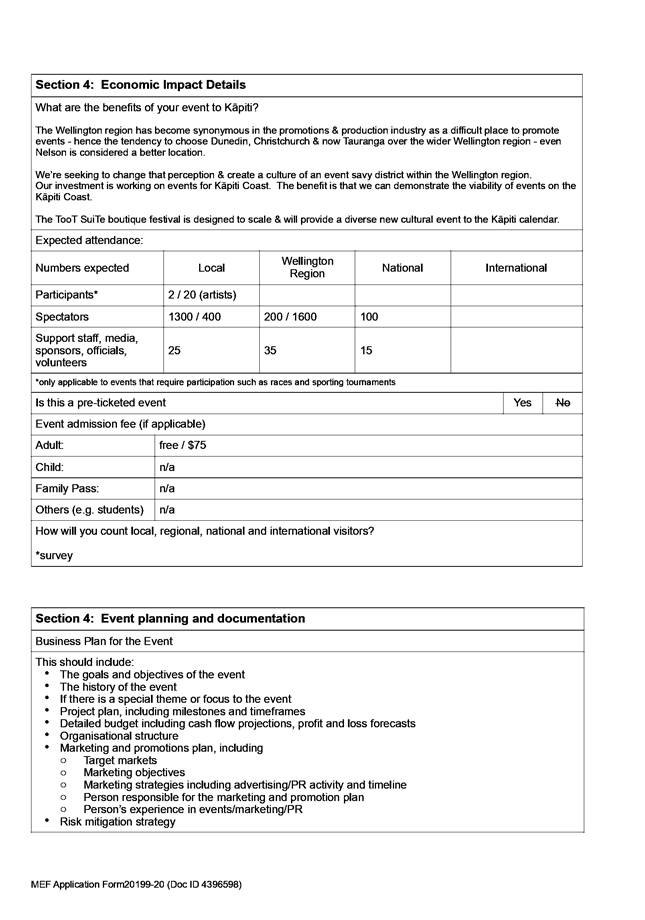























































|
Council Meeting Agenda
|
12 December 2019
|
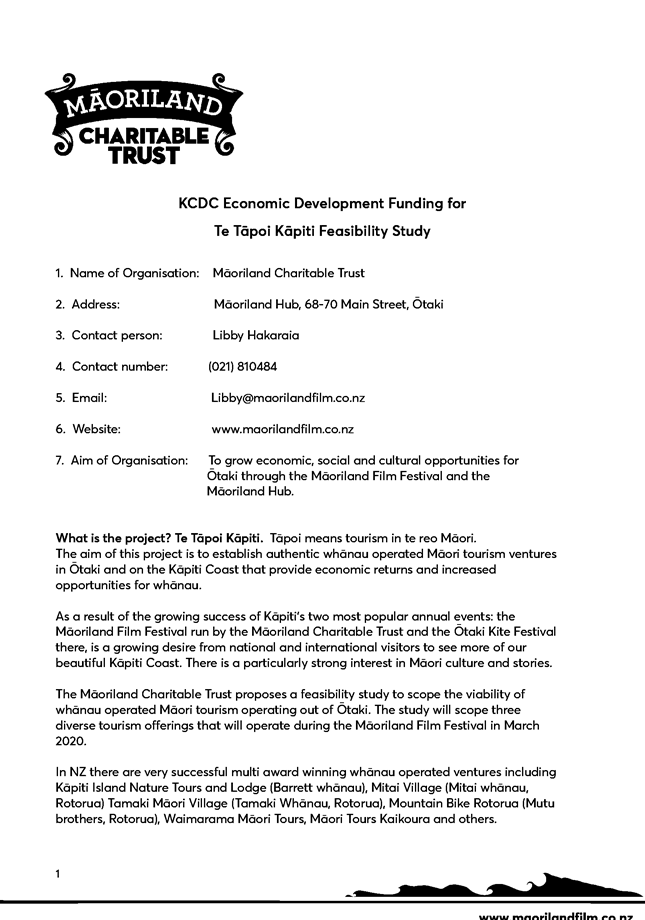
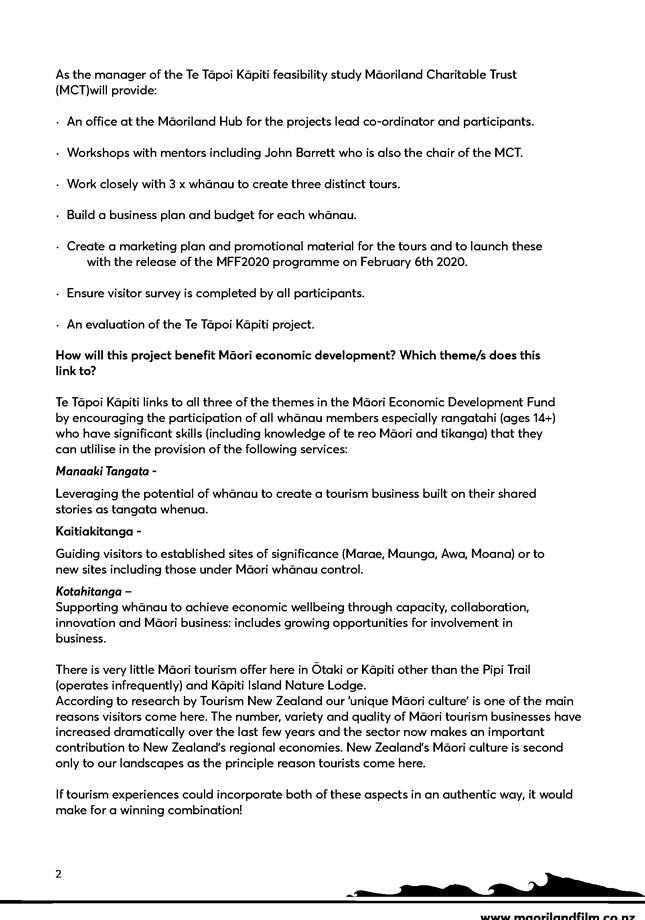



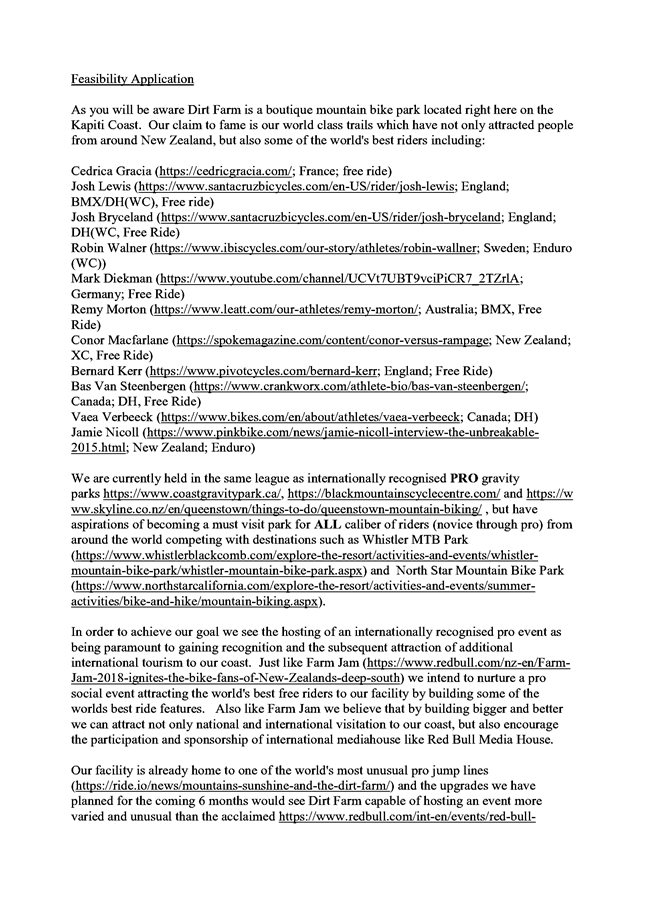

Applicant details
|
Event
|
Toot
Suite Boutique Festival
|
Type
|
Signature \ Major
|
|
Date
|
Saturday February 1st
2020
|
Funding request
|
$50,000
|
|
Applicant (business)
|
Plan BETA Limited
|
Frequency
|
1 year: ☒
2 years: ☐ 3 years: ☐
|
|
Contact name
|
Joff Rae
|
Funding type
|
Event funding / Feasibility
|
|
Contact phone
|
022 3783253
|
Attendees
|
>2,500
|
|
Contact email
|
info@planbeta.co.nz
|
Recommended
|
$25,000
|
|
Funding used for:
|
LED screen
Staging and infrastructure
Waste & rubbish management
TMP
|
|
Details provided
|
1. Introduction / business purpose /
experience / areas of expertise
|
☒
|
|
|
2. Proof of legally incorporated entity,
Trust or business
|
☒
|
|
|
3. Description of event or feasibility
study (with expected economic outcome)
|
☒
|
|
|
4. Risk assessment of proposed event/feasibility
study
|
☒
|
|
|
5. Project timeline detailing activities
|
☒
|
|
|
6. Balanced budget and detailed
marketing/promotional breakdown
|
☒
|
|
|
7. A communication plan (showing
acknowledgement of Council’s contribution)
|
☒
|
|
|
8. Organisation’s environmental
sustainability values.
|
☒
|
|
|
9. Understanding of economic outcomes of
events (thriving, vibrant and diverse District)
|
☒
|
|
|
10. Business plan showing three-year self-sustaining
funding approach
|
☒
|
|
|
11. Track record of previous relevant work
|
☒
|
|
|
12. References for similar projects
|
☒
|
|
|
|
|
|
Eligible:
|
The proposed major event:
|
|
|
· take place in Kāpiti
|
☒
|
|
· not have already occurred in the applicable financial year
|
☒
|
|
· have confirmed at least 30% of
total costs (not applicable to feasibility
applications)
|
☒
|
|
· show how residual costs after
allowing for Council funding will be covered (not applicable to feasibility
applications)
|
☒
|
|
· confirmation of any
consenting and land owner approval requirements and the status of any
required consents / approvals.
|
☒
|
Application
criteria total score:
Initial score of each proposal against each criterion using a
rating of 0 – 3 (to be discussed and peer-reviewed).
(0 = does
not address the criterion, 1 = fails to meet the criterion, 2 = meets the
criterion, 3 = exceeds the criterion)
|
The proposed major event: 15/18
|
Score (0-3)
|
|
· be a level 1 or 2 event as
classified in the decision making support tool
|
3
|
|
· showcase the Kāpiti Coast
and build the profile of the Kāpiti Coast and its community
|
3
|
|
· highlight the Kāpiti
Coast as a destination for visitors, business and residents
|
2
|
|
· have long-term economic
benefits for the district
|
2
|
|
· are able to generate at least a 5:1 return on
Council’s investment
|
3
|
|
· meet Tāngata whenua and community
aspirations
|
1
|
Preference
criteria
|
The proposed major event:
|
|
|
· attract visitors in the
off season (April to October)
|
☐
|
|
· can demonstrate successful
financial support from other
funding sources (not applicable to feasibility applications)
|
☒
|
|
· show potential
to be self-sustaining without Council
funding in future years (not applicable to feasibility applications);
|
☒
|
|
· have received less than three
years of previous funding from Council, excluding feasibility funding
|
☐
|
|
· do not coincide with any
other major events in the
Wellington region, unless compatible (not applicable to feasibility
applications)
|
☒
|
DECISION
TO FUND:
|
yes
|
Notes:
• Secured
30% of cost is dependent on ticket sales, sponsorship and other revenue
|
8.5 Waste
Minimisation Task Force report back
Author: Adrian
Mitchell, Solid Waste Services Manager
Authoriser: Sean
Mallon, Group Manager Infrastructure Services
Purpose of Report
1 This
report asks Council to receive the Appended “Final Report of the Waste
Minimisation Taskforce” and to thank the Taskforce members for the time
and effort they have committed in preparing their report
Delegation
2 As
the Waste Minimisation Taskforce is an advisory entity, the report of the
Taskforce is not subject to delegation.
Background
3 The
Waste Minimisation Taskforce was established by the following resolutions of
the Strategy and Operations Committee of Council on the 21st March
2019:
· That
the Strategy and Policy Committee approve the establishment of the Waste
Minimisation Taskforce.
· That
the Strategy and Operations Committee approve the Terms of Reference, as
amended, for the Waste Minimisation Taskforce.
4 The
Terms of Reference (TOR) and brief biographies of the Taskforce members are
included in the Taskforce report.
5 The
Purpose of the Taskforce as stated in the TOR was:
“The purpose of the
Taskforce is to review the actions listed in the 2017 Wellington Region Waste
management and Minimisation Plan (WMMP) and report back to Council on how these
actions can be implemented to achieve the most cost effective reduction in the
volume of waste materials in the District.”
6 The
Taskforce has now completed the Appended “Final Report of the Waste
Minimisation Taskforce”. Representatives of the Taskforce will
formally present the report to Council on 12 December 2019.
Issues
7 The
recommendations of the Taskforce will be used to inform the Solid Waste work
programme and officers will report back to Council on proposed actions in the
new Calendar year.
Considerations
Policy
considerations
8 In
September 2017 Council adopted the Wellington Region Waste Management and
Minimisation Plan (2017–2023) referenced in the Taskforce report
Legal
considerations
9 As
the Taskforce report is advisory there are no legal considerations relating to
this report
Financial
considerations
10 As
the Taskforce report is advisory there are no financial considerations relating
to this report. Any future financial consideration will be considered as part
of the further work to be carried out by staff in advance of the report back on
the proposed solid waste work programme in the new year.
Tāngata
whenua considerations
11 The
Taskforce membership included Iwi representation
Strategic
considerations
12 As
the Taskforce report is advisory there are on strategic considerations relating
to this report
Significance and Engagement
Significance
policy
13 As
the Taskforce report is advisory this matter has a low level of significance
under Council’s Significance and Engagement Policy.
Consultation
already undertaken
14 No
formal consultation was undertaken in relation to this report.
Engagement
planning
15 An
engagement plan is not required for this report.
Publicity
16 No
publicity is proposed for this report.
|
Recommendations
17 That
Council acknowledge receipt of the Final Report of the Waste Minimisation
Taskforce.
18 That
Council thanks the Taskforce members for the considerable skill, time and
effort they have committed in the preparation of the Final Report of the
Waste Minimisation Taskforce.
|
Appendices
1. WMTF
Final Report 5 December 2019 ⇩ 
|
Council
Meeting Agenda
|
12 December 2019
|









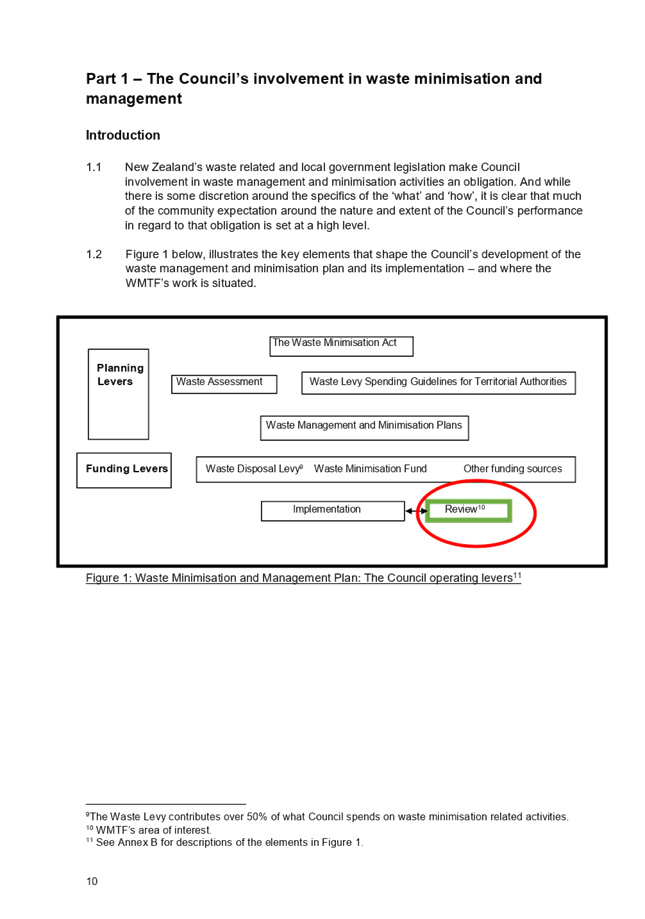
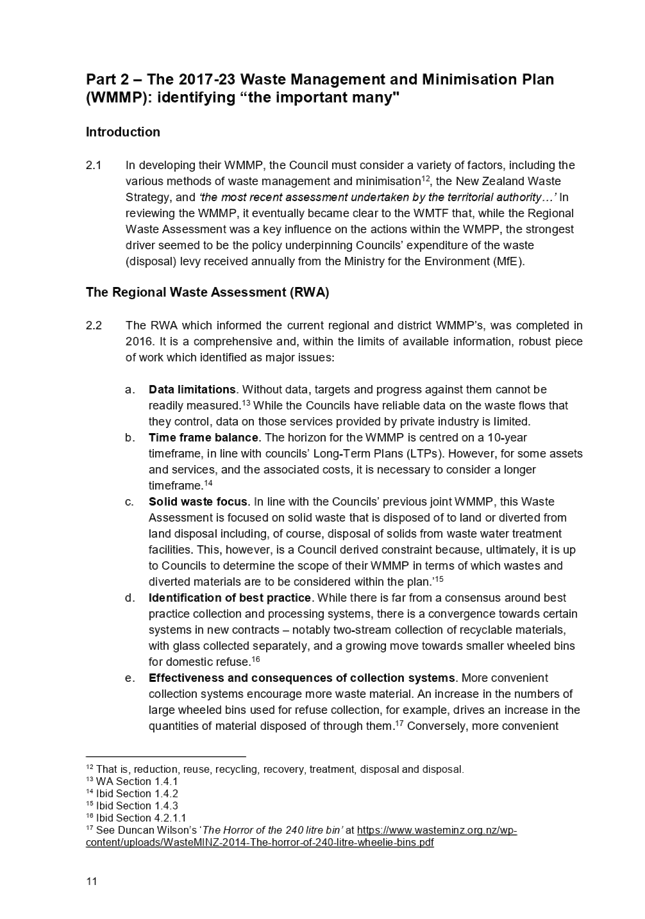
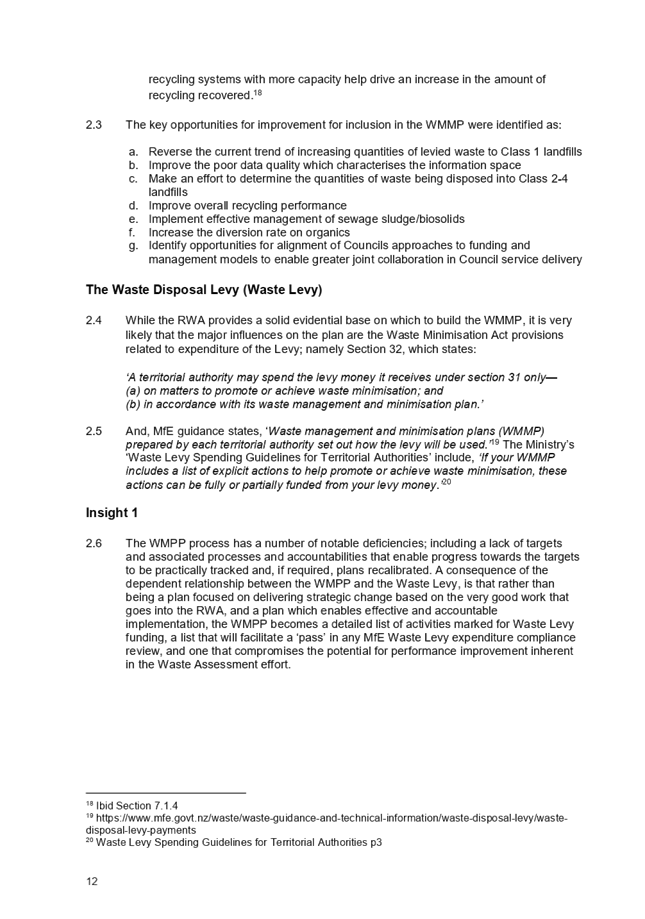
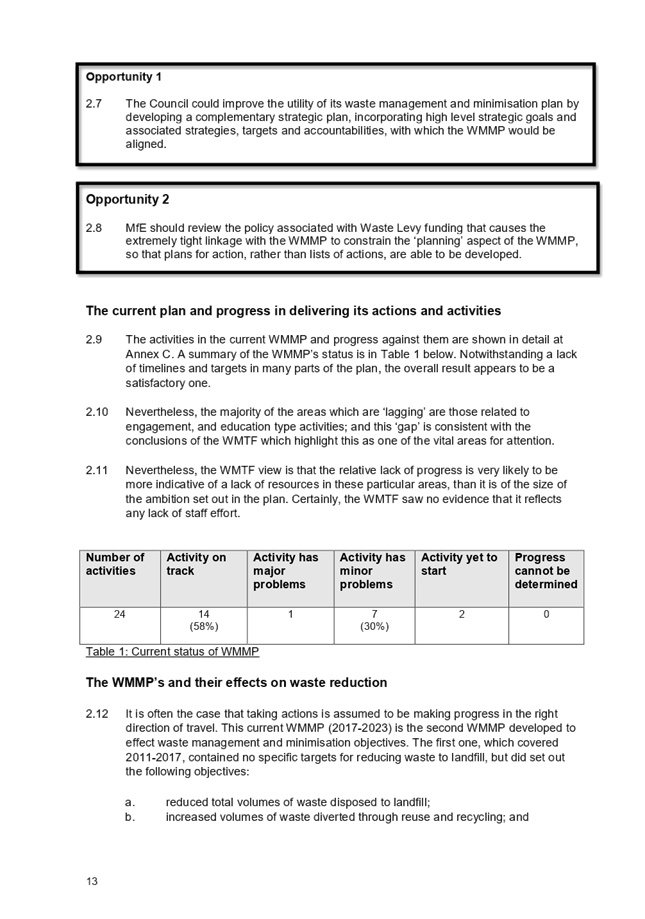
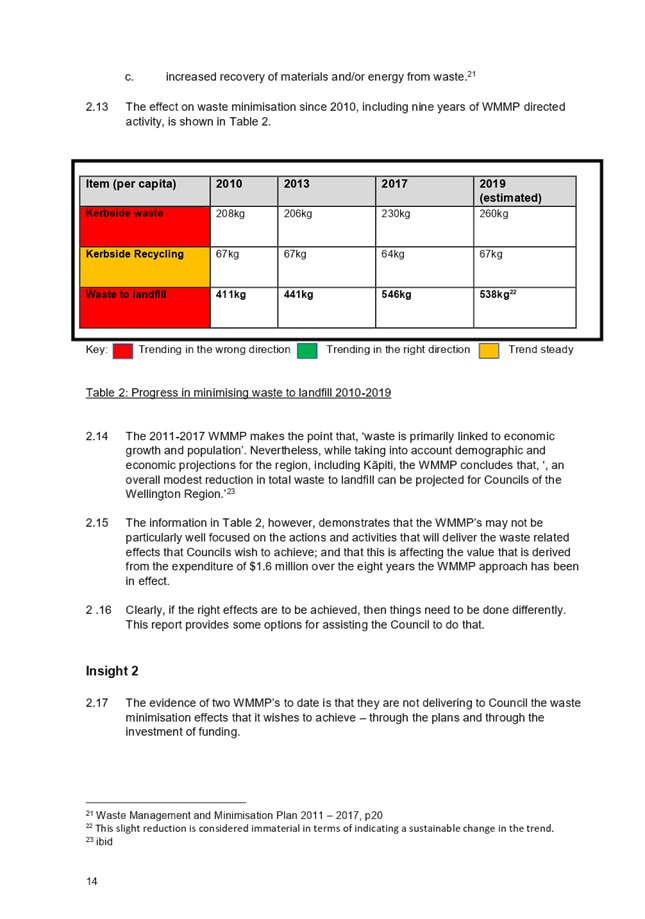


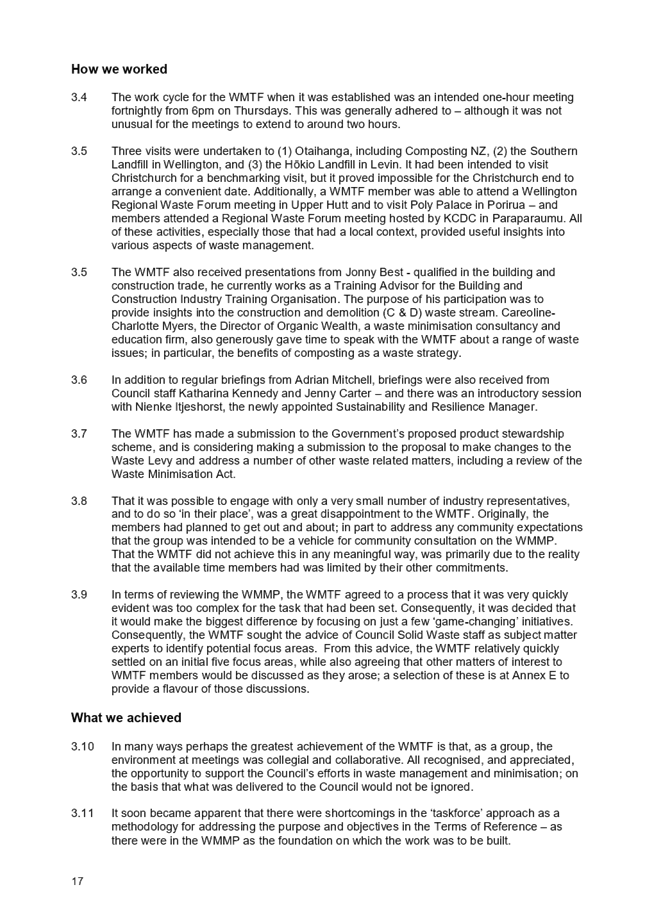

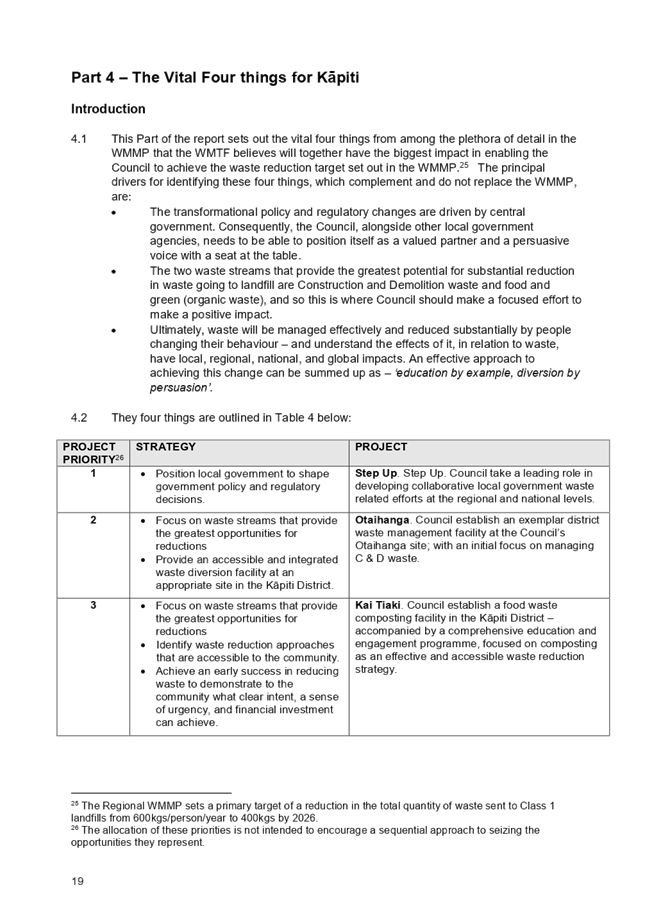
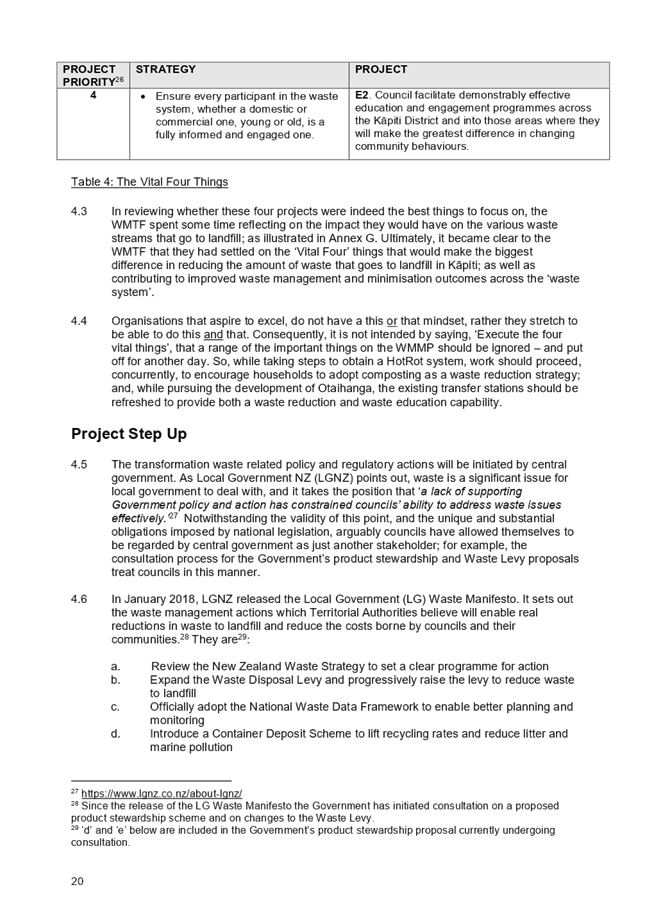



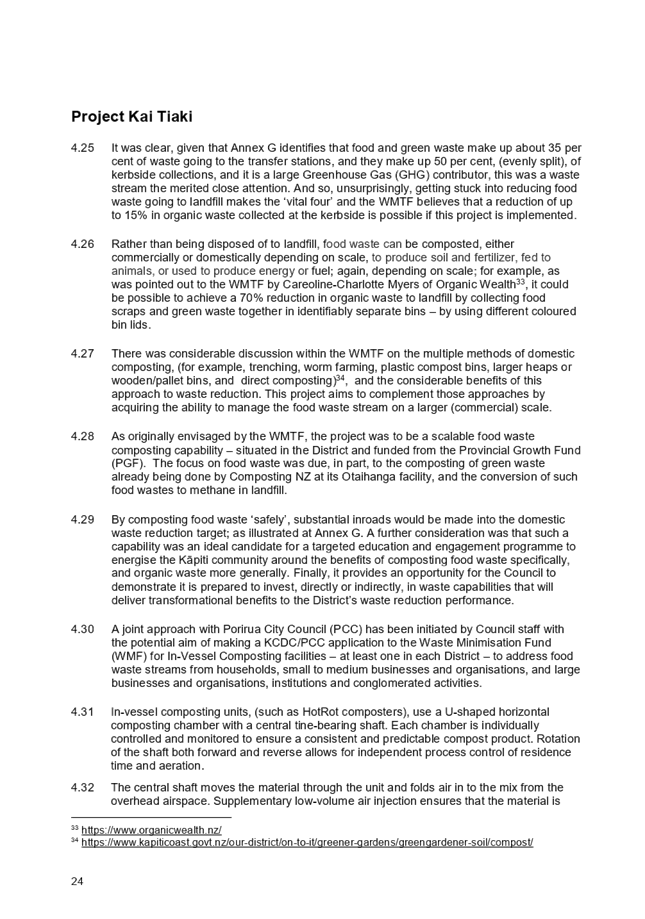
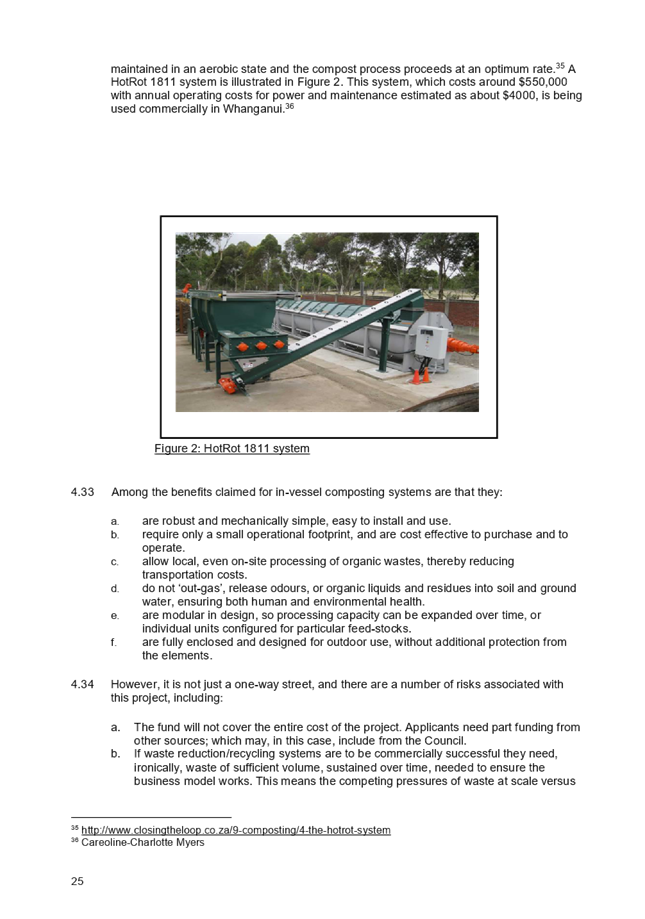

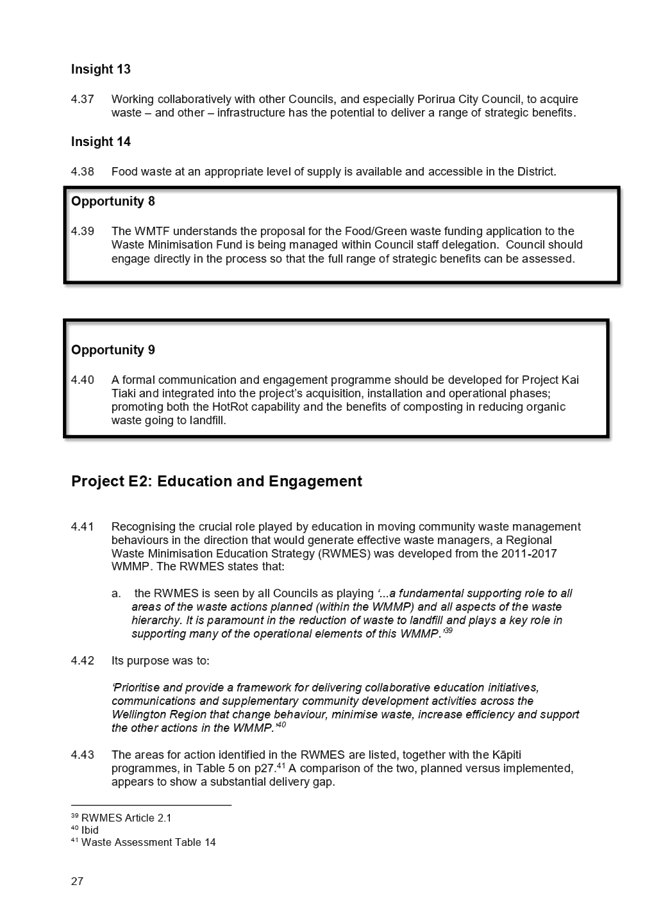

9 Confirmation
of Minutes
9.1 Confirmation
of Minutes 31 October 2019
Author: Tanicka
Mason, Democracy Services Advisor
Authoriser: Janice
McDougall, Group Manager
|
Recommendations
That the minutes of the
Council meeting on 31 October 2019 be accepted as a true and accurate record
of that meeting.
|
Appendices
1. Council
Minutes for 31 October 2019 ⇩ 
|
Council
Meeting Agenda
|
12 December 2019
|
MINUTES OF Kapiti Coast District Council
Council Meeting
HELD AT THE Southward
Car Museum, Otaihanga Road, Southward Car Museum, Otaihanga Road,, Paraparaumu
ON Thursday, 31
October 2019 AT 7.00pm
PRESENT: Mayor
K Gurunathan, Cr Janet Holborow, Cr Jocelyn Prvanov, Cr Angela Buswell, Cr Martin
Halliday, Cr James Cootes, Cr Jackie Elliott, Cr Bernie Randall, Cr Gwyn
Compton, Cr Robert McCann, Cr Sophie Handford
IN
ATTENDANCE: Koromatua
Don Te Maipi, Kuia June Davis, Shelly Wawrick, Jill Griggs, Margaret Stevenson
Wright, James Westbury, Grace Lindsay, Guy Burns, Kathy Spiers, Geoffrey
Churchman, Jonny Best, Marilyn Stevens, Christine Papps, Marilyn Stevens,
Steven Carkeek, Shelly Warwick, Daniel O’Connell, Tina Pope, Jess Hortop,
Wayne Maxwell, Janice McDougall, Sue George, Leyanne Belcher
APOLOGIES: Nil
1 Welcome
Tāngata whenua called the Councillors and Community
Board Members-Elect into the auditorium and onto the stage followed by speeches
and waiata.
The Chief Executive Wayne Maxwell who was presiding as
Chair, welcomed everyone and declared the inaugural meeting of the 2019-2022
Triennium open.
2 APOLOGIES
There were no apologies.
3 Declarations
by THE NEW MAYOR
The Chief Executive invited the Mayor-Elect K Gurunathan to
come forward and make his declaration. Mr Gurunathan read and signed the
statutory declaration pursuant to Schedule 7, Part 1, s14(3) of the Local
Government Act 2002, which was witnessed by the Chief Executive.
The Mayoral chains of office were placed on Mr Gurunathan by
June Davis on behalf of tāngata whenua.
The Mayor then took the Chair, and invited Councillors-Elect
to come forward and make their declarations.
4 DECLARATIONS
BY THE NEW COUNCILORS
Councillors individually read and signed their declarations
pursuant to Schedule 7, Part 1, s14(3) of the Local Government Act 2002, which
were witnessed by the Mayor.
5 DECLARATIONS
BY THE NEW COMMUNITY BOARD MEMBERS
The Mayor invited each Community Board group to come forward
and make their declarations.
Each Community Board member read their declarations together
pursuant to Schedule 7, Part 1, s14(3) of the Local Government Act 2002.
The Mayor clarified that Board members would be signing
their declarations at their own inaugural meetings
6 EXPLANATION
OF LEGISLATION FOR NEW ELECTED MEMBERS 2019-2022 tRIENNIUM
Pursuant to Schedule 7, clause 21(5)(c) of the Local
Government Act 2002 the Chief Executive gave an explanation of legislation
affecting Elected Members.
|
Motion
|
|
Resolution 2019/20
Moved: Mayor
K Gurunathan
Seconder: Cr Janet Holborow
That Elected
members of the 2019-2022 Triennium note the general explanation of
legislation provided by the Chief Executive pursuant to Section 21 of
Schedule 7, Local Government Act 2002.
Carried
|
7 DEPUTY
MAYOR APPOINTMENT BY THE MAYOR
Pursuant to section 41A(3)(a) of the Local Government Act
2002 he appointed Cr Janet Holborow as the Deputy Mayor for the 2019-2022
Triennium.
The Mayor made his inaugural speech.
Mayor Gurunathan congratulated new and re-elected
Councillors and looked forward to working with the new Council and tangata
whenua.
8 DATE
AND TIME OF NEXT MEETING OF COUNCIL
|
Motion
|
|
Resolution 2019/21
Moved: Mayor
K Gurunathan
Seconder: Cr Janet Holborow
That the
next meeting of the Kāpiti Coast District Council will be held on
Thursday 7 November at 10.00 am in Council Chambers, 175 Rimu Road,
Paraparaumu.
Carried
|
The National Anthem and waiata were sung. Council
kaumātua Don Te Maipi performed a karakia.
Council kaumātua Don Te Maipi performed a karakia.
The Council meeting closed
at 8.14pm.
...................................................
CHAIRPERSON
9.2 Confirmation
of Minutes 7 November 2019
Author: Tanicka
Mason, Democracy Services Advisor
Authoriser: Janice
McDougall, Group Manager
|
Recommendations
That the minutes of the Council
meeting on 7 November 2019 be accepted as a true and accurate record of that
meeting.
|
Appendices
1. Council
Minutes of 7 November 2019 ⇩ 
|
Council
Meeting Agenda
|
12 December 2019
|
MINUTES OF Kapiti Coast District Council
Council Meeting
HELD AT THE Council
Chamber, Ground Floor, 175 Rimu Road, Paraparaumu
ON Thursday, 7
November 2019 AT 10.00am
PRESENT: Mayor
K Gurunathan, Deputy Mayor Janet Holborow, Cr Angela Buswell, Cr James Cootes,
Cr Jackie Elliott, Cr Gwynn Compton, Cr Jocelyn Prvanov, Cr Martin Halliday, Cr
Sophie Handford, Cr Robert McCann, Cr Bernie Randall
IN
ATTENDANCE: Wayne Maxwell (Mr), Sean Mallon (Mr), Mark de Haast (Mr), Tim
Power (Mr), Susan Owens (Ms), Leyanne Belcher (Ms), Vyvien Starbuck-Maffey
(Ms).
APOLOGIES: Nil
LEAVE OF Nil
ABSENCE:
1 Welcome
The Mayor welcomed everyone to the first meeting of Council
for the new Triennium.
2 Council
Blessing
Cr Handford read out the Council blessing in te reo
Māori.
3 Apologies
Nil
4 Declarations
of Interest Relating to Items on the Agenda
None.
5 Public
Speaking Time for Items Relating to the Agenda
1. Trevor
Daniell from Grey Power looked forward to a positive relationship with the new
Council and mentioned the 2.5% pension increase compared to the 18% wage
increase for Councillors.
2. Guy
Burns from the Paraparaumu-Raumati Community Board spoke to item 8.2 and
referred to the Mayor’s election promise to increase the powers and
delegations of the Community Boards. The Mayor clarified it was still his
intent to pursue the matter with appropriate consultation and discussion with
elected members first. It would not have been possible to adequately consult in
time for the report to be presented today.
6 Members’
Business
(a) Public
Speaking Time Responses would be made at the time reports were considered.
(b) Leave
of Absence – none
(c) Matters
of an Urgent Nature (advise to be provided to the Chair prior to the
commencement of the meeting) - none
7 Mayor's
Report
Nil
8 Reports
|
8.1 Mayoral
Appointments and the Establishment of Committees
Democracy Services Manager Leyanne Belcher invited
questions and detailed a number of amendments proposed to the table in the
report. There was no discussion.
|
|
moved (mayor/buswelL)
That the Council notes the mayoral appointments of the
Deputy Mayor, Committee Chairperson, Subcommittee Chairpersons, and the
establishment of Committees including terms of reference for the 2019-2022
Triennium as at Appendix 1 of the Mayoral Appointments report.
CARRIED
|
|
8.2 Governance
Structure and Delegations 2019-2022 Triennium
Democracy Services Manager Leyanne Belcher invited
questions and detailed a number of amendments proposed to the table in the
report.
|
|
moved (mayor/elliott)
That the Council of the 2019-2022 Triennium:
(a) Notes
the Mayor’s appointment of Cr Janet Holborow as the Deputy Mayor;
(b) Notes
the Mayor’s establishment of Committees and appointment of Chairs and
membership of the following Committees:
|
MAYORAL
APPOINTMENTS UNDER S41A LGA 2002
|
|
COMMITTEE
|
CHAIR
|
MEMBERSHIP
|
|
Strategy
and Operations Committee
|
Cr Cootes
|
Mayor and all Councillors
Māori member with
voting rights
|
|
Audit and
Risk Subcommittee
|
Independent
|
Mayor, Deputy Mayor, Chair
of Strategy and Operations, Cr Buswell and 2 Independent Members with
voting rights.
|
|
Grants
Allocation Subcommittee
|
Cr
Elliott
|
Mayor, Deputy
Mayor, Cr McCann, Cr Halliday, Cr Randall and Cr Elliott
|
|
Appeals
Hearing Subcommittee
|
Mayor
|
Mayor, Deputy Mayor and
Chair of Strategy and Operations and Cr Prvanov
|
|
Chief Executive Performance
and Employment Subcommittee
|
Mayor
|
Mayor and all Councillors
|
Adopts in the case where there is more than one nomination
for the positions, System A or B as outlined in Schedule 7,
clause 25 of the Local Government Act 2002, for the election of the Deputy
Chairs of its Committees for the 2019-2022 Triennium;
Appoints Deputy Chairs of the Committees for the
2019-2022 Triennium as:
|
COMMITTEE
|
DEPUTY CHAIR
|
|
Strategy and Operations Committee
|
Cr Compton
|
|
Audit and Risk Subcommittee
|
Cr Buswell
|
|
Chief Executive Performance and Employment Subcommittee
|
Cr Holborow
|
|
Appeals Hearing Subcommittee
|
Cr Prvanov
|
|
Grants Allocation Subcommittee
|
Cr Buswell
|
Discharges Mr Gary Simpson from the Audit and Risk
committee and appoints him to the Audit and Risk Subcommittee until 31 August
2021.
Discharges Mr Bryan Jackson from the Audit and Risk
Committee and appoints him to the Audit and Risk Subcommittee until 1 July
2022.
Approves the appointment of one Māori representative
with voting rights to the Strategy and Operations Committee for the 2019-2022
Triennium, noting that the recruitment of the preferred nominee will be
coordinated through the Council’s independent partnership body Te
Whakaminenga o Kāpiti with a recommendation coming back to Council early
in 2020.
Discharges Janet Holborow, Fiona Vining, Jackie Elliott,
Mike Cardiff, Jocelyn Prvanov and K Gurunathan as transitional independent
hearing commissioners for resource consent applications as per the relevant
provisions of the Resource Management Act 1991.
Adopts the delegations for Committees, Subcommittee and
Community Boards as attached at Appendix 1 of this Governance Structure and
Delegations 2019-2022 report.
CARRIED
|
|
8.3 APPOINTMENT
OF WARD COUNCILLORS TO COMMUNITY BOARDS 2019-2022
|
|
MOVED (HOLBOROW/BUSWELL)
That
Council confirms the appointment of the following Ward Councillors to the
respective Community Boards for the 2019-2022 Triennium:
i. Ōtaki Community
Board
Councillor James Cootes
ii. Waikanae Community
Board
Councillor Jocelyn Prvanov
iii. Paraparaumu-Raumati Community
Board Councillor Martin Halliday
iv. Paraparaumu-Raumati Community
Board Councillor Bernie Randall
v. Paekākāriki Community
Board
Councillor Sophie Handford
CARRIED
|
|
8.4 APPOINTMENT
OF COUNCILLORS TO JOINT COMMITTEES AND EXTERNAL ORGANISATIONS 2019-2022
TRIENNIUM
Democracy Services Manager Leyanne Belcher invited
questions and clarified some of the appointments.
|
|
moved (compton/buswell)
That the
Council confirms the appointment of the Mayor, the
Paekākāriki-Raumati Ward Councillor Cr Handford, and the Chief
Executive to the Campe Estate Subcommittee for the 2019-2022 Triennium;
That the
Council makes appointments to council organisations for the 2019-2022
Triennium as follows:
|
No
|
Organisation/body
|
Appointees
|
|
1
|
Te Whakaminenga o Kāpiti
|
The Mayor and Cr Cootes
|
|
2
|
Kapiti Coast Youth Council
|
Cr Handford
|
|
3
|
Kapiti Coast Older Persons’ Council
|
The Mayor and Cr Halliday
|
|
4
|
Wellington Regional Strategy Joint Committee
|
The Mayor and Cr Holborow, as alternate to the Mayor
|
|
5
|
Wellington Regional Transport Joint Committee
|
The Mayor and Cr Cootes, as alternate to the Mayor
|
|
6
|
Wellington Regional Climate Change Working Group
(WRCCWG)
|
The Mayor and Cr Handford, as alternate to the Mayor
|
|
7
|
Friends of the Ōtaki River
|
Cr Buswell
|
|
8
|
Friends of the Waikanae River
|
Cr Prvanov
|
|
9
|
Pharazyn Reserve Focus Group
|
Referred to Waikanae Community Board for appointment of
one member
|
|
10
|
Kapiti Ecological Restoration Maintenance Trust
|
Cr Prvanov
|
|
11
|
Kapiti Coast Aircraft Noise Community Liaison Group
|
Referred to Paraparaumu-Raumati Community Group for
appointment of one member
|
|
12
|
Wellington Regional Waste Forum
|
Cr Elliott
|
|
13
|
Waste Minimisation Task Force
|
Cr Elliott
|
|
14
|
Wellington Region Waste Management and Minimisation
Joint Committee
|
Cr Elliott
|
|
15
|
Road Safety Advisory Group
|
Cr Randall and Cr Cootes
|
|
16
|
Kapiti Accessibility Advisory Group
|
Cr Holborow
|
|
17
|
Kapiti Cycleway, Walkway and Bridleway Advisory
Group
|
Cr Buswell and Cr Prvanov
|
|
18
|
Mahara Gallery Trust
|
Cr Holborow
|
|
19
|
Mahara Gallery Upgrade Project Steering Group
|
Cr Holborow
|
|
20
|
The Public Art Panel
|
Cr Holborow
|
|
21
|
LGNZ Policy Advisory Group
|
Cr Holborow
|
|
22
|
Paraparaumu College Community Sports Hall Committee
|
Cr Halliday and Cr Randall
|
|
CARRIED
|
8.5 Elected
Member Remuneration and Positions of Responsibility
Democracy Services Manager Leyanne Belcher clarified the
assignment of Councillors to the various portfolios.
|
|
MOVED (HOLBOROW/BUSWELL)
That the
Council makes the following portfolio allocations appointments for the
2019-2022 Triennium as follows:
|
Portfolios
|
Appointees
|
|
Cultural
wellbeing (inc. Arts)
|
Cr
Holborow
|
|
Transport
|
Cr
Cootes
|
|
Rural
GWRC
Economic
wellbeing
|
Cr
Compton
|
|
Business & Jobs
|
Cr Buswell
|
|
Waste
|
Cr
Elliott
|
|
Housing
Social
wellbeing
|
Cr
McCann
|
|
Climate
Youth
|
Cr
Handford
|
|
Environmental wellbeing
|
Cr
Prvanov
|
|
C Health
Seniors
|
Cr
Halliday
|
That the
Council approves the Portfolio job descriptions as attached at Appendix 2 of
this Elected Member Remuneration and Positions of Responsibility report.
That the
Council approves:
base
remuneration for Councillors of $36,000.00
additional
remuneration of $24,000.00 for the Deputy Mayor,
additional
remuneration of $19,000.00 for the Chair of the Strategy and Operations
Committee,
additional
remuneration of $14,610.00 for Portfolio A holders
additional
remuneration of $9,056.00 for Portfolio B holders
CARRIED
|
|
8.6 Draft
Calendar of Meetings 2019-20
Councillors commended the Chief Executive and staff on the
work done to produce the new calendar of meetings. The Chief Executive
clarified meeting attendance (the Mayor) at the Local Government NZ Rural and
Provincial meetings and recommended Councillors consider attending Zone4
meetings.
|
|
moved (holborow/cootes)
That the Council approves the calendar of meeting 2019-20
as detailed in Appendix 1 of this Draft Calendar of Meetings 2019-20 report,
noting that Council, Committee and Subcommittee meetings are generally
scheduled on a Thursday and start at 9.30am.
CARRIED
|
|
8.7 ADOPTION
OF STANDING ORDERS - 2019-2022 TRIENNIUM
Democracy Services Manager Leyanne Belcher spoke to the
report, reminding Councillors that nine out of 11 members would need to vote
in favour of the amendments presented today. A key change from previous
triennia was that, in addition to livestreaming meetings, video footage could
now be stored and uploaded to the Council website which represented an
increase in transparency. Councillors queried whether there were protocols in
place to prevent someone from downloading the footage and manipulating it.
Legal Counsel Tim Power clarified this would almost certainly constitute an
offence but he could provide more detailed advice later, as the law was
moving rapidly on this issue. Advice would be provided to Councillors.
The issue was raised about public speaking time provisions
for Māori/iwi being longer than three minutes in the original LGNZ
template. Last triennium Council had considered the matter but decided to
insert some broader wording around the Chair’s consideration of
bicultural requirements around public speaking time, and this would remain
unchanged.
Councillors agreed it would be useful to workshop the
Standing Orders next year.
|
|
moved (cootes/compton)
That Council adopt the set of Standing Orders as at
Attachment 1 of report ‘Adoption of Standing Orders – 2019-2022
Triennium’ with any additional amendments.
CARRIED
|
9 Confirmation
of Minutes
Nil
10 Public
Speaking Time
· Covering
other items if required - none
· Public
Speaking Time responses -none
11 Public
Excluded Reports
Nil
The Council meeting closed
at 10.46am.
...................................................
CHAIRPERSON
11 Public
Excluded Reports
Resolution
to Exclude the Public
|
PUBLIC EXCLUDED ReSOLUtion
That, pursuant to Section 48 of the Local Government
Official Information and Meetings Act 1987, the public, with the exception of
Community Board Chairs, now be excluded from the meeting for the reasons
given below, while the following matters are considered.
The general subject matter of each matter to be considered
while the public is excluded, the reason for passing this resolution in
relation to each matter, and the specific grounds under section 48(1) of the
Local Government Official Information and Meetings Act 1987 for the passing
of this resolution are as follows:
|
General subject of each matter to be considered
|
Reason for passing this resolution in relation to
each matter
|
Ground(s) under section 48 for the passing of this
resolution
|
|
11.1 - Appointment of Chair of the Audit and Risk
Subcomittee
|
Section 7(2)(a) - the withholding of the information is
necessary to protect the privacy of natural persons, including that of
deceased natural persons
|
Section 48(1)(a)(i) - the public conduct of the relevant
part of the proceedings of the meeting would be likely to result in the
disclosure of information for which good reason for withholding would exist
under section 6 or section 7
|
|

















































































































































